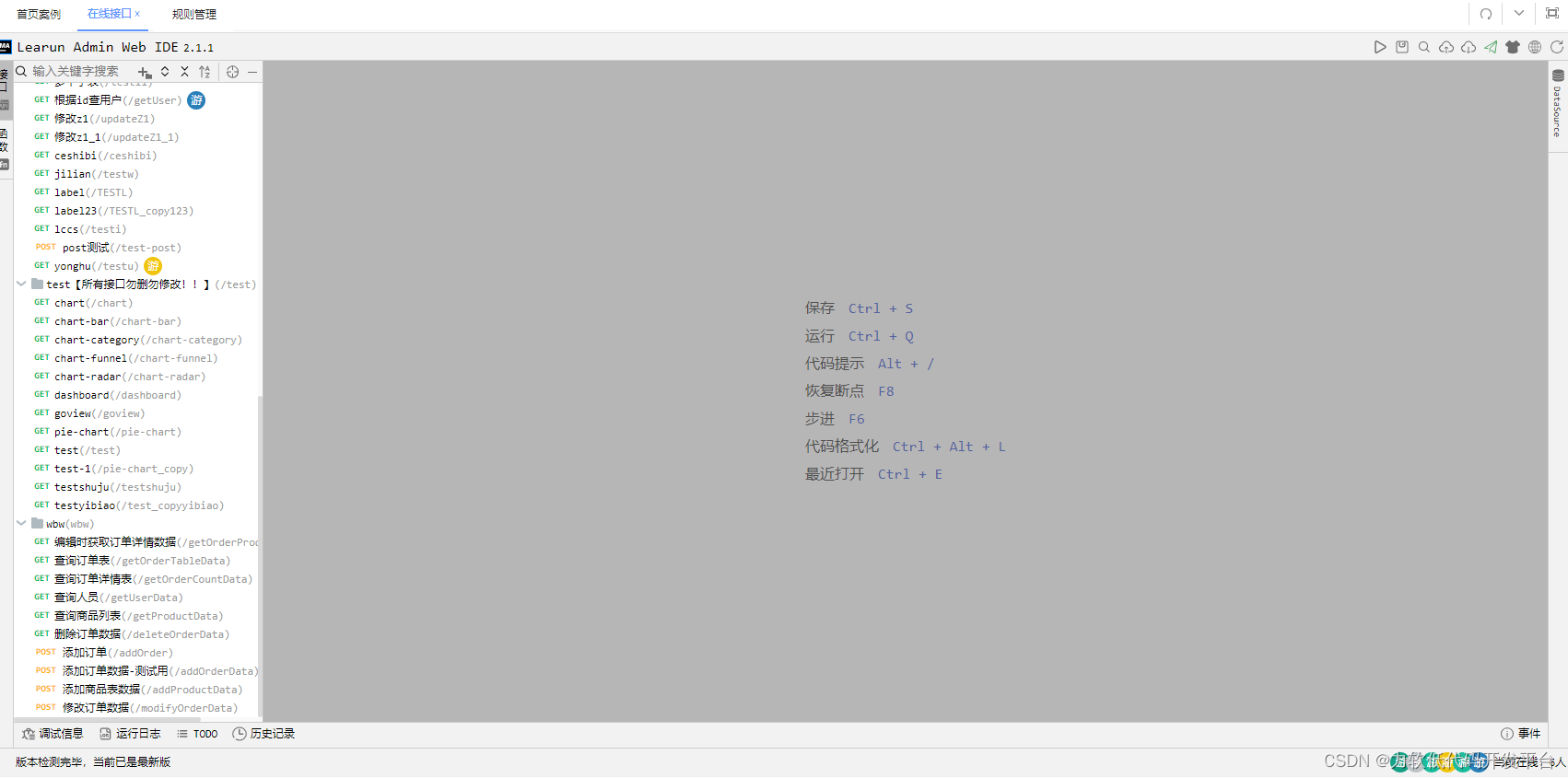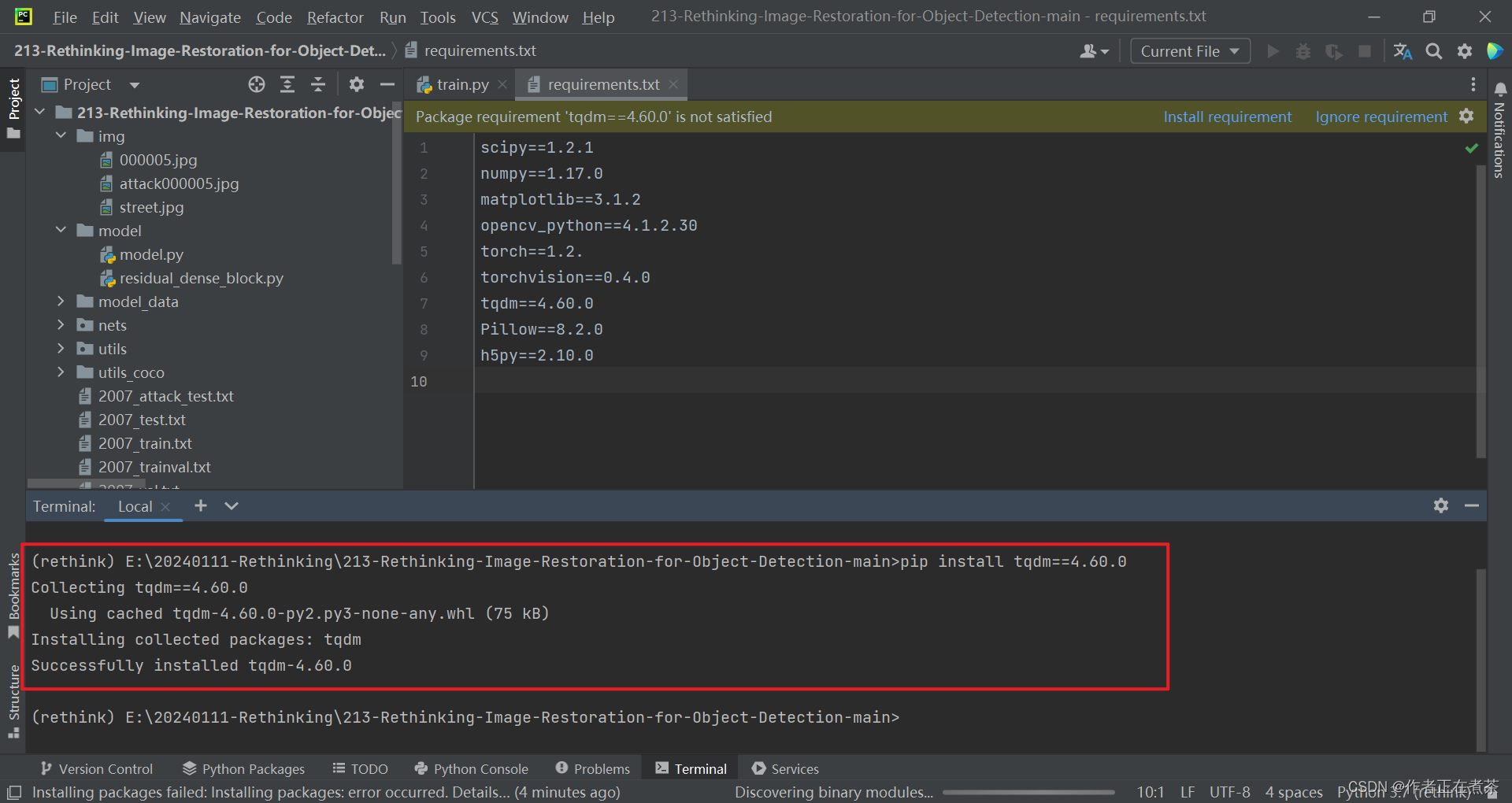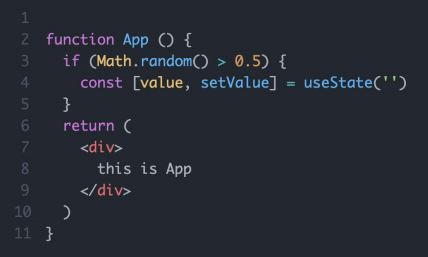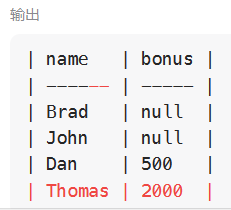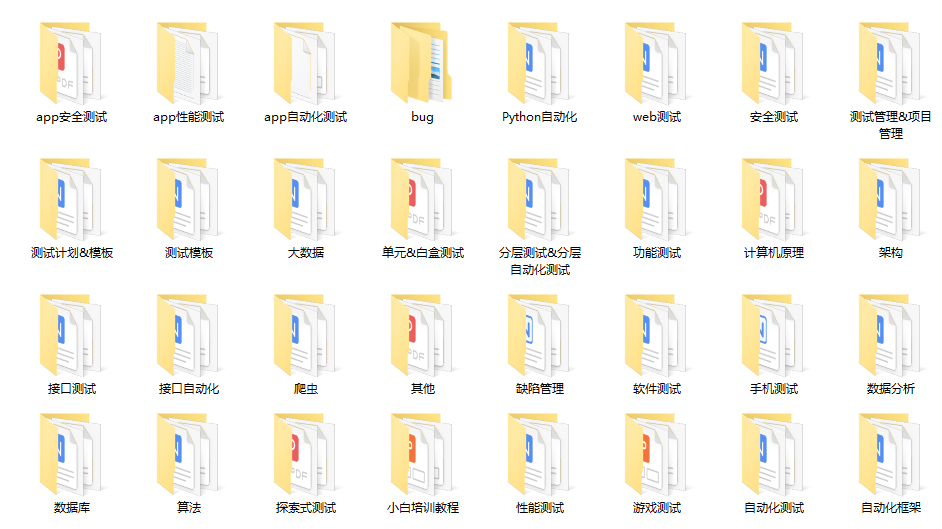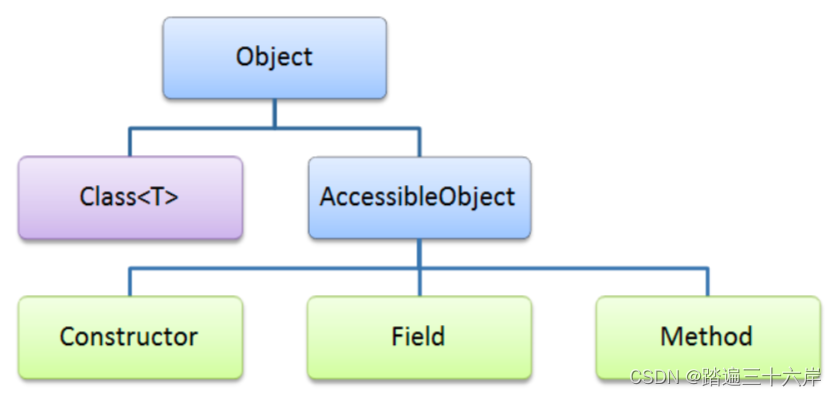一. NIO 基础
哔哩哔哩黑马程序员 netty实战视频
0.什么是nio?
NIO(New I/O)是Java中提供的一种基于通道和缓冲区的I/O(Input/Output)模型。它是相对于传统的IO(InputStream和OutputStream)模型而言的新型I/O模型。NIO的主要特点包括:
1.通道与缓冲区:
2.NIO引入了通道(Channel)和缓冲区(Buffer)的概念。通道是对传统IO中的流的抽象,它可以支持双向数据传输。而缓冲区则是存储数据的地方,数据在通道和缓冲区之间传递。
3.非阻塞IO:
4.NIO提供了非阻塞I/O操作的能力。在传统IO模型中,当一个线程在读取或写入数据时会被阻塞,而在NIO中,线程可以继续处理其他任务,而不必等待数据的读取或写入完成。
5.选择器(Selector):
6.NIO引入了选择器的概念,使得一个线程可以同时监控多个通道的IO事件。这样,一个线程可以有效地管理多个通道,从而提高系统的性能。
7.面向缓冲区的操作:
8.NIO中的数据读取和写入都是面向缓冲区的。数据首先被读取到缓冲区,然后再从缓冲区写入到通道,或者从通道读取到缓冲区。这种方式相对于直接流式IO更加灵活,可以更好地处理不同大小的数据块。
9.异步IO:
10.Java NIO提供了异步I/O操作的支持。通过使用Future、Callback等机制,可以实现异步的IO操作,使得程序可以在数据读取或写入的同时执行其他任务。
11.多路复用:
12.多路复用是NIO的一个重要特性,通过选择器可以实现同时管理多个通道的IO操作。这在高并发的网络应用中特别有用。
1. 三大组件
1.1 Channel & Buffer
channel 有一点类似于 stream,它就是读写数据的双向通道,可以从 channel 将数据读入 buffer,也可以将 buffer 的数据写入 channel,而之前的 stream 要么是输入,要么是输出,channel 比 stream 更为底层
常见的 Channel 有
- FileChannel
- DatagramChannel
- SocketChannel
- ServerSocketChannel
buffer 则用来缓冲读写数据,常见的 buffer 有
- ByteBuffer
- MappedByteBuffer
- DirectByteBuffer
- HeapByteBuffer
- ShortBuffer
- IntBuffer
- LongBuffer
- FloatBuffer
- DoubleBuffer
- CharBuffer
1.2 Selector
selector 单从字面意思不好理解,需要结合服务器的设计演化来理解它的用途
多线程版设计
⚠️ 多线程版缺点
- 内存占用高
- 线程上下文切换成本高 #cpu的线程是固定的,如果无限制增加线程处理请求会导致线程堵塞
- 只适合连接数少的场景
线程池版设计
⚠️ 线程池版缺点
- 阻塞模式下,线程仅能处理一个 socket 连接 //线程池中线程固定
- 仅适合短连接场景 //http
selector 版设计
selector 的作用就是配合一个线程来管理多个 channel,获取这些 channel 上发生的事件,这些 channel 工作在非阻塞模式下(不会因为单个线程的堵塞而失去效果),不会让线程吊死在一个 channel 上。适合连接数特别多,但流量低的场景(low traffic)
调用 selector 的 select() 会阻塞直到 channel 发生了读写就绪事件,这些事件发生,select 方法就会返回这些事件交给 thread 来处理
2. ByteBuffer
有一普通文本文件 data.txt,内容为
1234567890abcd
使用 FileChannel 来读取文件内容
@Slf4j
public class ChannelDemo1 {public static void main(String[] args) {try (RandomAccessFile file = new RandomAccessFile("helloword/data.txt", "rw")) {FileChannel channel = file.getChannel();ByteBuffer buffer = ByteBuffer.allocate(10);do {// 向 buffer 写入int len = channel.read(buffer);log.debug("读到字节数:{}", len);if (len == -1) {break;}// 切换 buffer 读模式buffer.flip();while(buffer.hasRemaining()) {log.debug("{}", (char)buffer.get());}// 切换 buffer 写模式buffer.clear();} while (true);} catch (IOException e) {e.printStackTrace();}}
}
输出
10:39:03 [DEBUG] [main] c.i.n.ChannelDemo1 - 读到字节数:10
10:39:03 [DEBUG] [main] c.i.n.ChannelDemo1 - 1
10:39:03 [DEBUG] [main] c.i.n.ChannelDemo1 - 2
10:39:03 [DEBUG] [main] c.i.n.ChannelDemo1 - 3
10:39:03 [DEBUG] [main] c.i.n.ChannelDemo1 - 4
10:39:03 [DEBUG] [main] c.i.n.ChannelDemo1 - 5
10:39:03 [DEBUG] [main] c.i.n.ChannelDemo1 - 6
10:39:03 [DEBUG] [main] c.i.n.ChannelDemo1 - 7
10:39:03 [DEBUG] [main] c.i.n.ChannelDemo1 - 8
10:39:03 [DEBUG] [main] c.i.n.ChannelDemo1 - 9
10:39:03 [DEBUG] [main] c.i.n.ChannelDemo1 - 0
10:39:03 [DEBUG] [main] c.i.n.ChannelDemo1 - 读到字节数:4
10:39:03 [DEBUG] [main] c.i.n.ChannelDemo1 - a
10:39:03 [DEBUG] [main] c.i.n.ChannelDemo1 - b
10:39:03 [DEBUG] [main] c.i.n.ChannelDemo1 - c
10:39:03 [DEBUG] [main] c.i.n.ChannelDemo1 - d
10:39:03 [DEBUG] [main] c.i.n.ChannelDemo1 - 读到字节数:-1
2.1 ByteBuffer 正确使用姿势
向 buffer 写入数据,例如调用 channel.read(buffer)
调用 flip() 切换至读模式
从 buffer 读取数据,例如调用 buffer.get()
调用 clear() 或 compact() 切换至写模式
重复 1~4 步骤
flip()是java.nio.ByteBuffer类中的一个方法,它用于将缓冲区的当前读取位置设置为缓冲区的开始位置,并将缓冲区的大小调整为等于缓冲区剩余的字节数。在将缓冲区中的数据写入网络或文件之前,通常需要调用
flip()方法,以便将缓冲区中的数据移动到读取位置。这样,下一次从缓冲区中读取数据时,就可以从缓冲区的开始位置开始读取
channel和buffer分别是java.nio.channels.Channel和java.nio.ByteBuffer两个类。
Channel类是 NIO 中的核心接口,它表示一个通信通道,如套接字、文件描述符等。它提供了一种将字节数据从一个地方读取到另一个地方的方法,可以用于网络编程、文件读写等场景。
ByteBuffer类是 NIO 中的缓冲区类,它提供了一种高效的字节读写操作。它允许将字节数据从一个地方读取到另一个地方,同时提供了一些方法来改变当前读取和写入的位置,以及调整缓冲区的大小等。
channel.read(buffer)语句表示从指定的channel中读取数据到buffer中。channel.read(buffer)会尝试读取数据到buffer中,直到buffer中的字节数达到或超过buffer.capacity()或者读取到 EOF(表示读取到了流的末尾)。如果读取到了 EOF,则返回 -1,否则返回读取到的字节数。这个语句的作用是将
channel中的数据读取到buffer中,从而可以对读取到的数据进行处理。如果读取到了 EOF,说明已经读取到了流的末尾,可以关闭channel和buffer,或者重新设置buffer的位置,以便读取下一部分数据。
2.2 ByteBuffer 结构
ByteBuffer 有以下重要属性
- capacity
- position
- limit
一开始

写模式下,position 是写入位置,limit 等于容量,下图表示写入了 4 个字节后的状态

flip 动作发生后,position 切换为读取位置,limit 切换为读取限制

读取 4 个字节后,状态

clear 动作发生后,状态

compact 方法,是把未读完的部分向前压缩,然后切换至写模式

💡 调试工具类
public class ByteBufferUtil {private static final char[] BYTE2CHAR = new char[256];private static final char[] HEXDUMP_TABLE = new char[256 * 4];private static final String[] HEXPADDING = new String[16];private static final String[] HEXDUMP_ROWPREFIXES = new String[65536 >>> 4];private static final String[] BYTE2HEX = new String[256];private static final String[] BYTEPADDING = new String[16];static {final char[] DIGITS = "0123456789abcdef".toCharArray();for (int i = 0; i < 256; i++) {HEXDUMP_TABLE[i << 1] = DIGITS[i >>> 4 & 0x0F];HEXDUMP_TABLE[(i << 1) + 1] = DIGITS[i & 0x0F];}int i;// Generate the lookup table for hex dump paddingsfor (i = 0; i < HEXPADDING.length; i++) {int padding = HEXPADDING.length - i;StringBuilder buf = new StringBuilder(padding * 3);for (int j = 0; j < padding; j++) {buf.append(" ");}HEXPADDING[i] = buf.toString();}// Generate the lookup table for the start-offset header in each row (up to 64KiB).for (i = 0; i < HEXDUMP_ROWPREFIXES.length; i++) {StringBuilder buf = new StringBuilder(12);buf.append(NEWLINE);buf.append(Long.toHexString(i << 4 & 0xFFFFFFFFL | 0x100000000L));buf.setCharAt(buf.length() - 9, '|');buf.append('|');HEXDUMP_ROWPREFIXES[i] = buf.toString();}// Generate the lookup table for byte-to-hex-dump conversionfor (i = 0; i < BYTE2HEX.length; i++) {BYTE2HEX[i] = ' ' + StringUtil.byteToHexStringPadded(i);}// Generate the lookup table for byte dump paddingsfor (i = 0; i < BYTEPADDING.length; i++) {int padding = BYTEPADDING.length - i;StringBuilder buf = new StringBuilder(padding);for (int j = 0; j < padding; j++) {buf.append(' ');}BYTEPADDING[i] = buf.toString();}// Generate the lookup table for byte-to-char conversionfor (i = 0; i < BYTE2CHAR.length; i++) {if (i <= 0x1f || i >= 0x7f) {BYTE2CHAR[i] = '.';} else {BYTE2CHAR[i] = (char) i;}}}/*** 打印所有内容* @param buffer*/public static void debugAll(ByteBuffer buffer) {int oldlimit = buffer.limit();buffer.limit(buffer.capacity());StringBuilder origin = new StringBuilder(256);appendPrettyHexDump(origin, buffer, 0, buffer.capacity());System.out.println("+--------+-------------------- all ------------------------+----------------+");System.out.printf("position: [%d], limit: [%d]\n", buffer.position(), oldlimit);System.out.println(origin);buffer.limit(oldlimit);}/*** 打印可读取内容* @param buffer*/public static void debugRead(ByteBuffer buffer) {StringBuilder builder = new StringBuilder(256);appendPrettyHexDump(builder, buffer, buffer.position(), buffer.limit() - buffer.position());System.out.println("+--------+-------------------- read -----------------------+----------------+");System.out.printf("position: [%d], limit: [%d]\n", buffer.position(), buffer.limit());System.out.println(builder);}private static void appendPrettyHexDump(StringBuilder dump, ByteBuffer buf, int offset, int length) {if (isOutOfBounds(offset, length, buf.capacity())) {throw new IndexOutOfBoundsException("expected: " + "0 <= offset(" + offset + ") <= offset + length(" + length+ ") <= " + "buf.capacity(" + buf.capacity() + ')');}if (length == 0) {return;}dump.append(" +-------------------------------------------------+" +NEWLINE + " | 0 1 2 3 4 5 6 7 8 9 a b c d e f |" +NEWLINE + "+--------+-------------------------------------------------+----------------+");final int startIndex = offset;final int fullRows = length >>> 4;final int remainder = length & 0xF;// Dump the rows which have 16 bytes.for (int row = 0; row < fullRows; row++) {int rowStartIndex = (row << 4) + startIndex;// Per-row prefix.appendHexDumpRowPrefix(dump, row, rowStartIndex);// Hex dumpint rowEndIndex = rowStartIndex + 16;for (int j = rowStartIndex; j < rowEndIndex; j++) {dump.append(BYTE2HEX[getUnsignedByte(buf, j)]);}dump.append(" |");// ASCII dumpfor (int j = rowStartIndex; j < rowEndIndex; j++) {dump.append(BYTE2CHAR[getUnsignedByte(buf, j)]);}dump.append('|');}// Dump the last row which has less than 16 bytes.if (remainder != 0) {int rowStartIndex = (fullRows << 4) + startIndex;appendHexDumpRowPrefix(dump, fullRows, rowStartIndex);// Hex dumpint rowEndIndex = rowStartIndex + remainder;for (int j = rowStartIndex; j < rowEndIndex; j++) {dump.append(BYTE2HEX[getUnsignedByte(buf, j)]);}dump.append(HEXPADDING[remainder]);dump.append(" |");// Ascii dumpfor (int j = rowStartIndex; j < rowEndIndex; j++) {dump.append(BYTE2CHAR[getUnsignedByte(buf, j)]);}dump.append(BYTEPADDING[remainder]);dump.append('|');}dump.append(NEWLINE +"+--------+-------------------------------------------------+----------------+");}private static void appendHexDumpRowPrefix(StringBuilder dump, int row, int rowStartIndex) {if (row < HEXDUMP_ROWPREFIXES.length) {dump.append(HEXDUMP_ROWPREFIXES[row]);} else {dump.append(NEWLINE);dump.append(Long.toHexString(rowStartIndex & 0xFFFFFFFFL | 0x100000000L));dump.setCharAt(dump.length() - 9, '|');dump.append('|');}}public static short getUnsignedByte(ByteBuffer buffer, int index) {return (short) (buffer.get(index) & 0xFF);}
}
演示工具类 (需要导入netty依赖)
<dependency><groupId>io.netty</groupId><artifactId>netty-all</artifactId><version>4.1.68.Final</version></dependency>
申明buffer10byte的缓冲空间 分别存入 a b c d 后的缓存区变化 上面是索引 下面是值
buffer.put((byte)0x61);//'a'debugAll(buffer);buffer.put(new byte[]{0x62,0x63,0x64});//'bcd'debugAll(buffer);
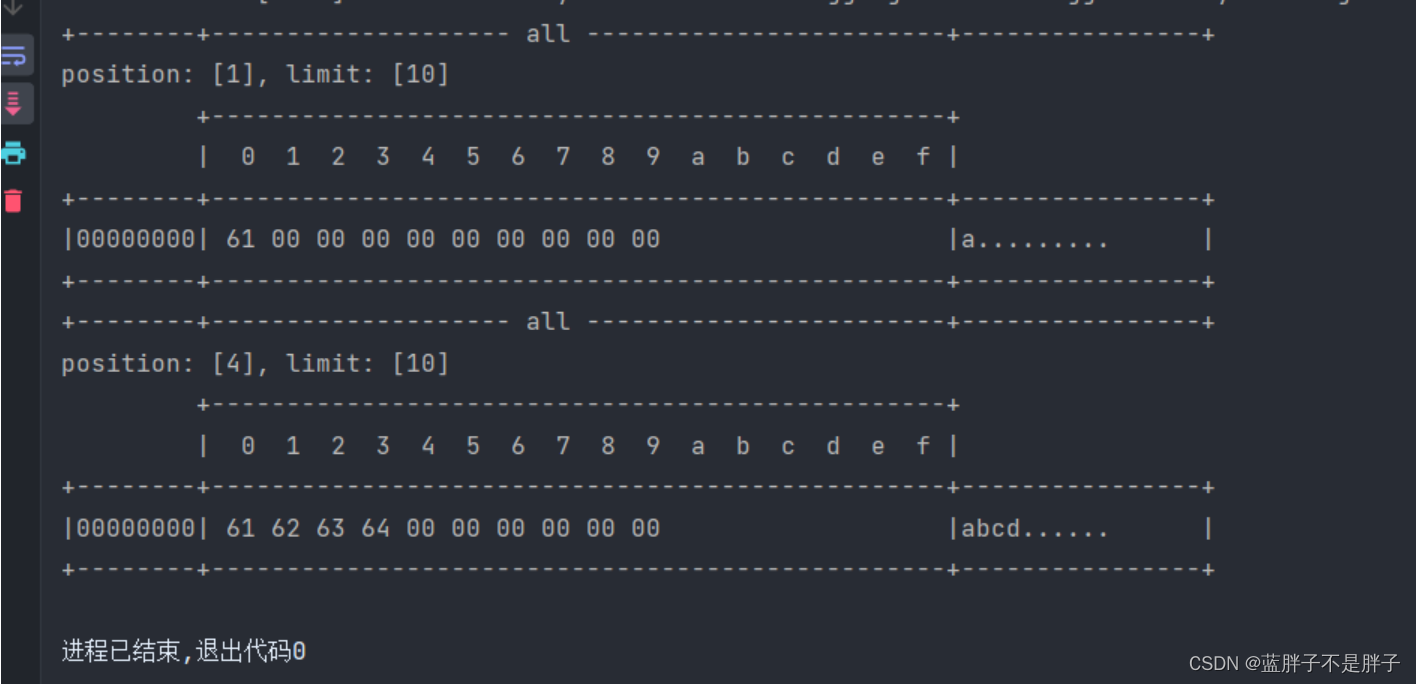
读取缓存的字符 读取之前需要使用flip api将position 当前位置指针移到队列头(保存完数据后 读取的开始指针在当前数据末尾加一 无法读取数据)
buffer.flip();//切换读模式System.out.println("============开始读取");while (buffer.hasRemaining()) {
// 是否剩余 ? true:falsebyte b = buffer.get();System.out.println(b);debugAll(buffer);//展示读取后的队列图
//}
从头开始读取转换到10进制,position读取后指针向后加一
外链图片转存失败,源站可能有防盗链机制,建议将图片保存下来直接上传
使用compact将为读完的数据想前压缩,指针也跟着向前
buffer.put((byte)0x61);//'a'
// 最初buffer.put(new byte[]{0x62,0x63});//'bcd'System.out.println("初始状态");debugAll(buffer);
// debugAll(buffer);buffer.flip();//切换读模式buffer.get();buffer.get();buffer.compact();//移动position和没读到的字节
// 继续跟着保存System.out.println("============开始读取 此时剩内容向前移动");buffer.put(new byte[]{0x64,0x65});debugAll(buffer);//展示读取后的队列图
读取了俩次就是是说position后移到第2个位置63时候,使用compact api把数据和指针移动到首位,此时再插入数据,便拼接在63之后
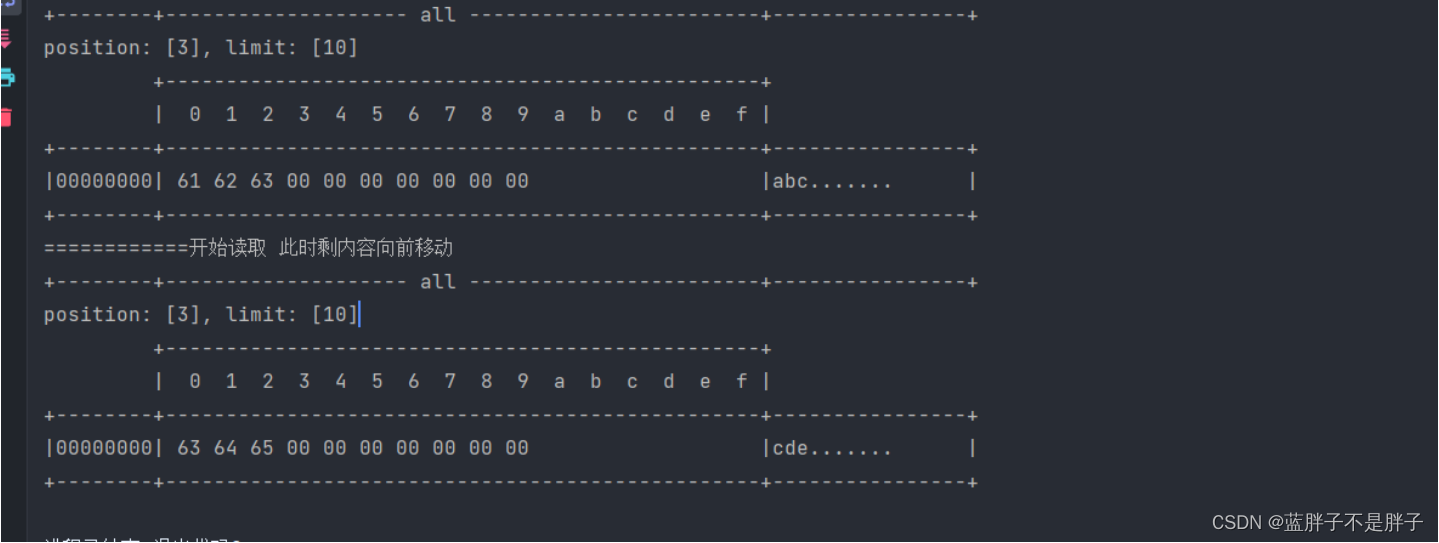
2.3 ByteBuffer 常见方法
分配空间
可以使用 allocate 方法为 ByteBuffer 分配空间,其它 buffer 类也有该方法
Bytebuffer buf = ByteBuffer.allocate(16);
分配空间的api 有以下俩种
/*** allocate分配的缓冲区是堆内存* 会收到jvm的垃圾回收机制* 读写性能低,适合在java堆内存较小的场景下使用 和其他类一样使用的都是堆内存* 堆内存不足,会抛出OutOfMemoryError* 堆内存不足,可通过-Xms10m -Xmx10m -XX:+PrintGCDetails -* Directallocate 直接内存* 直接内存分配回收成本高(系统内存 jvm 调用系统内存底层的api有调用成本),但是读写性能高,适合使用在需要经常进行读写、内存大小确定的场景下* 直接内存大小,可通过-XX:MaxDirectMemorySize指定* 直接内存不足,会抛出OutOfMemoryError* 直接内存不足,可通过-XX:+PrintGCDetails -XX:+PrintGCDateStamps -Xloggc:gc.log查看*/System.out.println(ByteBuffer.allocate(16).getClass());System.out.println(ByteBuffer.allocateDirect(16).getClass());
向 buffer 写入数据
有两种办法
- 调用 channel 的 read 方法
- 调用 buffer 自己的 put 方法
int readBytes = channel.read(buf);
和
buf.put((byte)127);
从 buffer 读取数据
同样有两种办法
- 调用 channel 的 write 方法
- 调用 buffer 自己的 get 方法
int writeBytes = channel.write(buf);
和
byte b = buf.get();
get 方法会让 position 读指针向后走,如果想重复读取数据
- 可以调用 rewind 方法将 position 重新置为 0
- 或者调用 get(int i) 方法获取索引 i 的内容,它不会移动读指针
此时又从(0)第一个数据开始读取
ByteBuffer buffer = ByteBuffer.allocate(10);buffer.put(new byte[]{0x61,0x62,0x63,0x64,0x65,0x66});System.out.println("Testing-----------初始视图-------------");debugAll(buffer);// get 读取buffer.flip();
// 并将其赋值给 buffer.get(new byte[2]);。这意味着从 buffer 中获取两个字节的数据,并将它们存储在 new byte[2] 数组中。
//buffer.get(new byte[2]);System.out.println("读取后的视图");debugAll(buffer);buffer.rewind();System.out.println("============开始从头开始读取");buffer.get();debugAll(buffer);
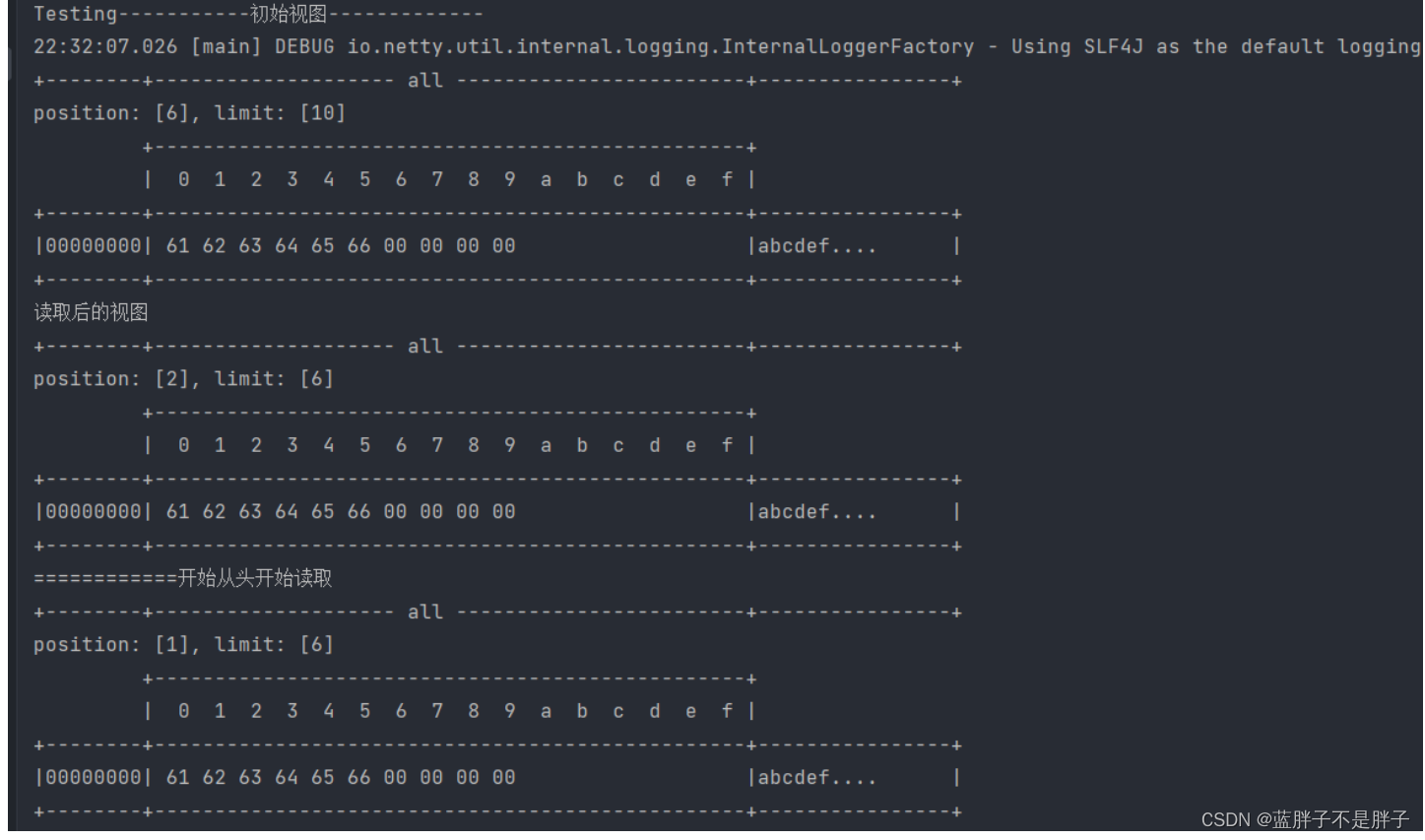
源码
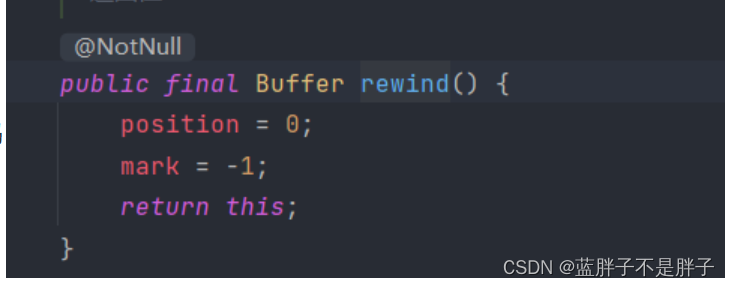
mark 和 reset
mark 是在读取时,做一个标记,即使 position 改变,只要调用 reset 就能回到 mark 的位置(中间位置需要返复读取)
注意
rewind 和 flip 都会清除 mark 位置
ByteBuffer buffer = ByteBuffer.allocate(10);buffer.put(new byte[]{0x61,0x62,0x63,0x64,0x65,0x66});buffer.flip();System.out.println((char) buffer.get());System.out.println((char) buffer.get());debugAll(buffer);
// mark 标记此时position的位置buffer.mark();System.out.println((char) buffer.get());System.out.println((char) buffer.get());System.out.println("从标记处重置");buffer.reset();debugAll(buffer);System.out.println((char) buffer.get());System.out.println((char) buffer.get());输出重复读取俩次cd
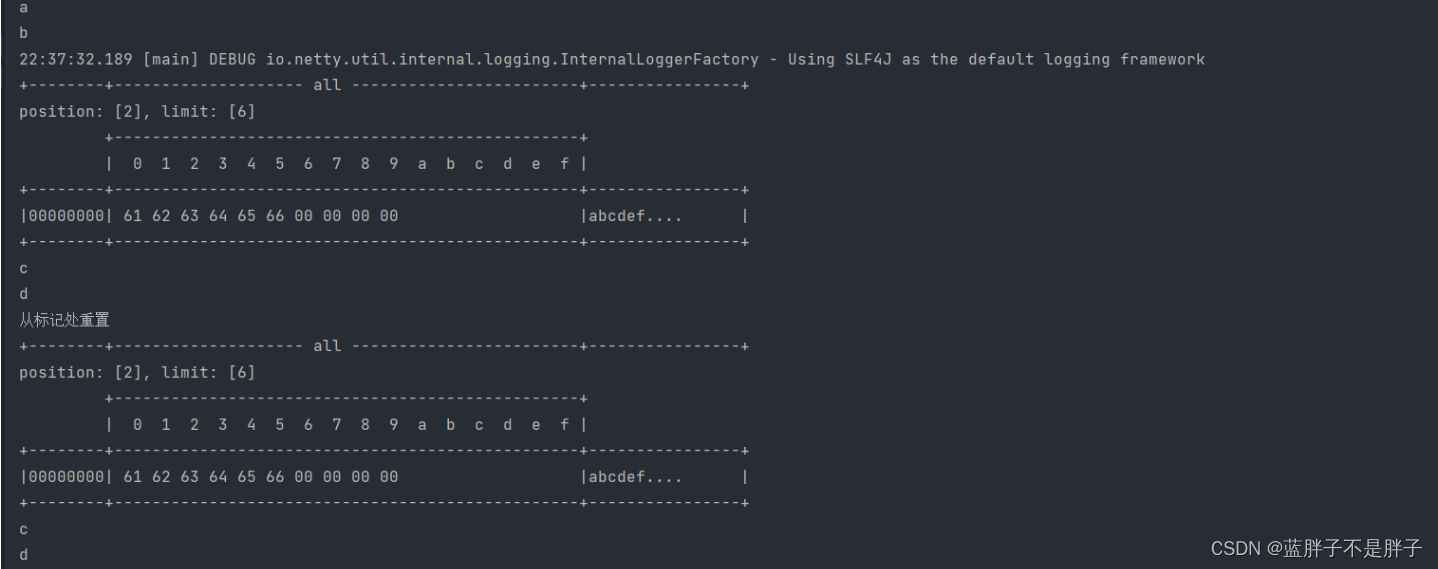
get(i) 根据在buffer中的索引读取 并且不会改变position
System.out.println((char) buffer.get(5)); //精确读取上诉结构的66
字符串与 ByteBuffer 互转
byte[] bytes = "你好世界".getBytes();
// 得到字节后数组ByteBuffer buffer = ByteBuffer.allocate(16);buffer.put(bytes);debugAll(buffer);
utif-8的编码

byte[] bytes = "你好世界".getBytes();
// 得到字节后数组ByteBuffer buffer = ByteBuffer.allocate(16);buffer.put(bytes);buffer.flip();
// debugAll(buffer);
//转换为字符String s = new String(bytes, Charset.defaultCharset());String s1 = StandardCharsets.UTF_8.decode(buffer).toString();//这个api 转换为buffer后自动position移动到开始ByteBuffer buffer1 = StandardCharsets.UTF_8.encode("你好世界");//和上诉一样效果ByteBuffer.wrap("你好世界".getBytes());System.out.println(s);System.out.println(s1);
输出
+-------------------------------------------------+| 0 1 2 3 4 5 6 7 8 9 a b c d e f |
+--------+-------------------------------------------------+----------------+
|00000000| e4 bd a0 e5 a5 bd |...... |
+--------+-------------------------------------------------+----------------++-------------------------------------------------+| 0 1 2 3 4 5 6 7 8 9 a b c d e f |
+--------+-------------------------------------------------+----------------+
|00000000| e4 bd a0 e5 a5 bd |...... |
+--------+-------------------------------------------------+----------------+
class java.nio.HeapCharBuffer
你好
值得注意的是使用byte转字符串时候,如果不是使用字节编码类encode给到的buffer,不会自动转position,需要手动调用flip(),不然解答码失败
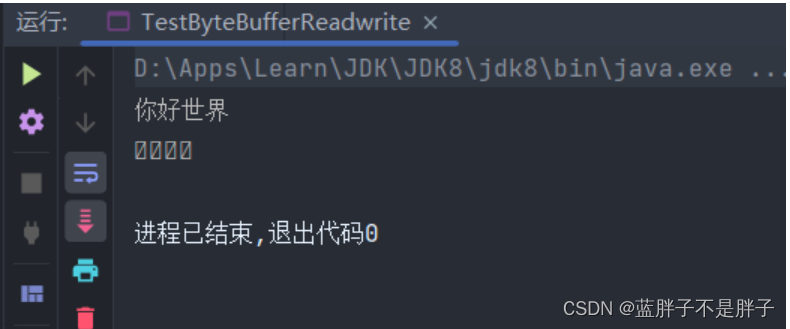
⚠️ Buffer 的线程安全
Buffer 是非线程安全的
2.4 Scattering Reads
分散读取,有一个文本文件 3parts.txt
onetwothree
使用如下方式读取,可以将数据填充至多个 buffer
try (RandomAccessFile file = new RandomAccessFile("helloword/3parts.txt", "rw")) {FileChannel channel = file.getChannel();ByteBuffer a = ByteBuffer.allocate(3);ByteBuffer b = ByteBuffer.allocate(3);ByteBuffer c = ByteBuffer.allocate(5);channel.read(new ByteBuffer[]{a, b, c});a.flip();b.flip();c.flip();debug(a);debug(b);debug(c);
} catch (IOException e) {e.printStackTrace();
}
结果
+-------------------------------------------------+| 0 1 2 3 4 5 6 7 8 9 a b c d e f |
+--------+-------------------------------------------------+----------------+
|00000000| 6f 6e 65 |one |
+--------+-------------------------------------------------+----------------++-------------------------------------------------+| 0 1 2 3 4 5 6 7 8 9 a b c d e f |
+--------+-------------------------------------------------+----------------+
|00000000| 74 77 6f |two |
+--------+-------------------------------------------------+----------------++-------------------------------------------------+| 0 1 2 3 4 5 6 7 8 9 a b c d e f |
+--------+-------------------------------------------------+----------------+
|00000000| 74 68 72 65 65 |three |
+--------+-------------------------------------------------+----------------+
2.5 Gathering Writes
使用如下方式写入,可以将多个 buffer 的数据填充至 channel
try (RandomAccessFile file = new RandomAccessFile("helloword/3parts.txt", "rw")) {FileChannel channel = file.getChannel();ByteBuffer d = ByteBuffer.allocate(4);ByteBuffer e = ByteBuffer.allocate(4);channel.position(11);d.put(new byte[]{'f', 'o', 'u', 'r'});e.put(new byte[]{'f', 'i', 'v', 'e'});d.flip();e.flip();debug(d);debug(e);channel.write(new ByteBuffer[]{d, e});
} catch (IOException e) {e.printStackTrace();
}
输出
+-------------------------------------------------+| 0 1 2 3 4 5 6 7 8 9 a b c d e f |
+--------+-------------------------------------------------+----------------+
|00000000| 66 6f 75 72 |four |
+--------+-------------------------------------------------+----------------++-------------------------------------------------+| 0 1 2 3 4 5 6 7 8 9 a b c d e f |
+--------+-------------------------------------------------+----------------+
|00000000| 66 69 76 65 |five |
+--------+-------------------------------------------------+----------------+
文件内容
onetwothreefourfive
2.6 练习
网络上有多条数据发送给服务端,数据之间使用 \n 进行分隔
但由于某种原因这些数据在接收时,被进行了重新组合,例如原始数据有3条为
- Hello,world\n
- I’m zhangsan\n
- How are you?\n
变成了下面的两个 byteBuffer (黏包,半包)
- Hello,world\nI’m zhangsan\nHo
- w are you?\n
现在要求你编写程序,将错乱的数据恢复成原始的按 \n 分隔的数据
public static void main(String[] args) {ByteBuffer source = ByteBuffer.allocate(32);// 11 24source.put("Hello,world\nI'm zhangsan\nHo".getBytes());split(source);source.put("w are you?\nhaha!\n".getBytes());split(source);
}private static void split(ByteBuffer source) {source.flip();int oldLimit = source.limit();for (int i = 0; i < oldLimit; i++) {if (source.get(i) == '\n') {System.out.println(i);ByteBuffer target = ByteBuffer.allocate(i + 1 - source.position());// 0 ~ limitsource.limit(i + 1);target.put(source); // 从source 读,向 target 写debugAll(target);source.limit(oldLimit);}}//循环跑完 避免剩下的元素没有被遍历到 使用compact将剩下元素移动,和下次元素做拼接source.compact();
}
3. 文件编程
3.1 FileChannel
⚠️ FileChannel 工作模式
FileChannel 只能工作在阻塞模式下
获取
不能直接打开 FileChannel,必须通过 FileInputStream、FileOutputStream 或者 RandomAccessFile 来获取 FileChannel,它们都有 getChannel 方法
- 通过 FileInputStream 获取的 channel 只能读
- 通过 FileOutputStream 获取的 channel 只能写
- 通过 RandomAccessFile 是否能读写根据构造 RandomAccessFile 时的读写模式决定
读取
会从 channel 读取数据填充 ByteBuffer,返回值表示读到了多少字节,-1 表示到达了文件的末尾
int readBytes = channel.read(buffer);
写入
写入的正确姿势如下, SocketChannel
ByteBuffer buffer = ...;
buffer.put(...); // 存入数据
buffer.flip(); // 切换读模式while(buffer.hasRemaining()) {channel.write(buffer);
}
在 while 中调用 channel.write 是因为 write 方法并不能保证一次将 buffer 中的内容全部写入 channel
关闭
channel 必须关闭,不过调用了 FileInputStream、FileOutputStream 或者 RandomAccessFile 的 close 方法会间接地调用 channel 的 close 方法
位置
获取当前位置
long pos = channel.position();
设置当前位置
long newPos = ...;
channel.position(newPos);
设置当前位置时,如果设置为文件的末尾
- 这时读取会返回 -1
- 这时写入,会追加内容,但要注意如果 position 超过了文件末尾,再写入时在新内容和原末尾之间会有空洞(00)
大小
使用 size 方法获取文件的大小
强制写入
操作系统出于性能的考虑,会将数据缓存,不是立刻写入磁盘。可以调用 force(true) 方法将文件内容和元数据(文件的权限等信息)立刻写入磁盘
3.2 两个 Channel 传输数据
String FROM = "helloword/data.txt";
String TO = "helloword/to.txt";
long start = System.nanoTime();
try (FileChannel from = new FileInputStream(FROM).getChannel();FileChannel to = new FileOutputStream(TO).getChannel();) {from.transferTo(0, from.size(), to);
} catch (IOException e) {e.printStackTrace();
}
long end = System.nanoTime();
System.out.println("transferTo 用时:" + (end - start) / 1000_000.0);
输出
transferTo 用时:8.2011
// 文件通道 阻塞模式下 俩个channel数据传输
public class FileChanelTransfelto {public static void main(String[] args) {try (FileChannel channel = new FileInputStream("README.md").getChannel();//输入流FileChannel fileChannel = new FileOutputStream("target.txt").getChannel();//输出流到){// 效率高 比bytebuffer效率高底层使用了零靠拷贝/*** "零拷贝(Zero Copy)" 是指在数据传输或复制时,不需要将数据从一个缓冲区(例如内核缓冲区)拷贝到另一个缓冲区,从而提高性能并减少资源消耗。在这个代码片段中,transferTo 方法被认为是一种零拷贝技术。** 在使用 FileChannel 的 transferTo 方法时,底层系统能够直接将数据从源通道传输到目标通道,而无需在中间缓冲区进行数据拷贝。这是因为操作系统内核提供了相关系统调用,允许直接在文件之间传输数据,* 而不涉及在用户空间的数据拷贝。这种方式在性能上通常比通过缓冲区一块一块地拷贝数据的方式更高效。*/channel.transferTo(0,channel.size(),fileChannel);//把输入流的数据输出到输出流的目的地}catch (FileNotFoundException e){e.printStackTrace();} catch (IOException e) {throw new RuntimeException(e);}}
}超过 2g 大小的文件传输 文件大小限制到了2g
public class TestFileChannelTransferTo {public static void main(String[] args) {try (FileChannel from = new FileInputStream("data.txt").getChannel();FileChannel to = new FileOutputStream("to.txt").getChannel();) {// 效率高,底层会利用操作系统的零拷贝进行优化long size = from.size();// left 变量代表还剩余多少字节for (long left = size; left > 0; ) {System.out.println("position:" + (size - left) + " left:" + left);left -= from.transferTo((size - left), left, to);}} catch (IOException e) {e.printStackTrace();}}
}
实际传输一个超大文件
position:0 left:7769948160
position:2147483647 left:5622464513
position:4294967294 left:3474980866
position:6442450941 left:1327497219
3.3 Path
jdk7 引入了 Path 和 Paths 类
- Path 用来表示文件路径
- Paths 是工具类,用来获取 Path 实例
Path source = Paths.get("1.txt"); // 相对路径 使用 user.dir 环境变量来定位 1.txtPath source = Paths.get("d:\\1.txt"); // 绝对路径 代表了 d:\1.txtPath source = Paths.get("d:/1.txt"); // 绝对路径 同样代表了 d:\1.txtPath projects = Paths.get("d:\\data", "projects"); // 代表了 d:\data\projects
.代表了当前路径..代表了上一级路径
例如目录结构如下
d:|- data|- projects|- a|- b
代码
Path path = Paths.get("d:\\data\\projects\\a\\..\\b");
System.out.println(path);
System.out.println(path.normalize()); // 正常化路径
会输出
d:\data\projects\a\..\b
d:\data\projects\b
3.4 Files
检查文件是否存在
Path path = Paths.get("helloword/data.txt");
System.out.println(Files.exists(path));
创建一级目录
Path path = Paths.get("helloword/d1");
Files.createDirectory(path);
- 如果目录已存在,会抛异常 FileAlreadyExistsException
- 不能一次创建多级目录,否则会抛异常 NoSuchFileException
创建多级目录用
Path path = Paths.get("helloword/d1/d2");
Files.createDirectories(path);
拷贝文件
Path source = Paths.get("helloword/data.txt");
Path target = Paths.get("helloword/target.txt");Files.copy(source, target);
- 如果文件已存在,会抛异常 FileAlreadyExistsException
如果希望用 source 覆盖掉 target,需要用 StandardCopyOption 来控制
Files.copy(source, target, StandardCopyOption.REPLACE_EXISTING);
移动文件
Path source = Paths.get("helloword/data.txt");
Path target = Paths.get("helloword/data.txt");Files.move(source, target, StandardCopyOption.ATOMIC_MOVE);
- StandardCopyOption.ATOMIC_MOVE 保证文件移动的原子性
删除文件
Path target = Paths.get("helloword/target.txt");Files.delete(target);
- 如果文件不存在,会抛异常 NoSuchFileException
删除目录
Path target = Paths.get("helloword/d1");Files.delete(target);
- 如果目录还有内容,会抛异常 DirectoryNotEmptyException
遍历目录文件
public static void main(String[] args) throws IOException {Path path = Paths.get("C:\\Program Files\\Java\\jdk1.8.0_91");AtomicInteger dirCount = new AtomicInteger();AtomicInteger fileCount = new AtomicInteger();Files.walkFileTree(path, new SimpleFileVisitor<Path>(){@Overridepublic FileVisitResult preVisitDirectory(Path dir, BasicFileAttributes attrs) throws IOException {System.out.println(dir);dirCount.incrementAndGet();return super.preVisitDirectory(dir, attrs);}@Overridepublic FileVisitResult visitFile(Path file, BasicFileAttributes attrs) throws IOException {System.out.println(file);fileCount.incrementAndGet();return super.visitFile(file, attrs);}});System.out.println(dirCount); // 133System.out.println(fileCount); // 1479
}
统计 jar 的数目
Path path = Paths.get("C:\\Program Files\\Java\\jdk1.8.0_91");
AtomicInteger fileCount = new AtomicInteger();
Files.walkFileTree(path, new SimpleFileVisitor<Path>(){@Overridepublic FileVisitResult visitFile(Path file, BasicFileAttributes attrs) throws IOException {if (file.toFile().getName().endsWith(".jar")) {fileCount.incrementAndGet();}return super.visitFile(file, attrs);}
});
System.out.println(fileCount); // 724
删除多级目录
Path path = Paths.get("d:\\a");
Files.walkFileTree(path, new SimpleFileVisitor<Path>(){@Overridepublic FileVisitResult visitFile(Path file, BasicFileAttributes attrs) throws IOException {Files.delete(file);return super.visitFile(file, attrs);}@Overridepublic FileVisitResult postVisitDirectory(Path dir, IOException exc) throws IOException {Files.delete(dir);return super.postVisitDirectory(dir, exc);}
});
⚠️ 删除很危险
删除是危险操作,确保要递归删除的文件夹没有重要内容
拷贝多级目录
long start = System.currentTimeMillis();
String source = "D:\\Snipaste-1.16.2-x64";
String target = "D:\\Snipaste-1.16.2-x64aaa";Files.walk(Paths.get(source)).forEach(path -> {try {String targetName = path.toString().replace(source, target);// 是目录if (Files.isDirectory(path)) {Files.createDirectory(Paths.get(targetName));}// 是普通文件else if (Files.isRegularFile(path)) {Files.copy(path, Paths.get(targetName));}} catch (IOException e) {e.printStackTrace();}
});
long end = System.currentTimeMillis();
System.out.println(end - start);
4. 网络编程
服务器和客户端之间建立通道 nio通道俩边都可以读取,所以服务器的接收客户端的请求后 俩边都可以对通道进行操作 io
4.1 非阻塞 vs 阻塞
阻塞
- 阻塞模式下,相关方法都会导致线程暂停
- ServerSocketChannel.accept 会在没有连接建立时让线程暂停
- SocketChannel.read 会在没有数据可读时让线程暂停
- 阻塞的表现其实就是线程暂停了,暂停期间不会占用 cpu,但线程相当于闲置
- 单线程下,阻塞方法之间相互影响,几乎不能正常工作,需要多线程支持
- 但多线程下,有新的问题,体现在以下方面
- 32 位 jvm 一个线程 320k,64 位 jvm 一个线程 1024k,如果连接数过多,必然导致 OOM,并且线程太多,反而会因为频繁上下文切换导致性能降低
- 可以采用线程池技术来减少线程数和线程上下文切换,但治标不治本,如果有很多连接建立,但长时间 inactive,会阻塞线程池中所有线程,因此不适合长连接,只适合短连接
服务器端
// 使用 nio 来理解阻塞模式, 单线程
// 0. ByteBuffer
ByteBuffer buffer = ByteBuffer.allocate(16);
// 1. 创建了服务器
ServerSocketChannel ssc = ServerSocketChannel.open();// 2. 绑定监听端口
ssc.bind(new InetSocketAddress(8080));// 3. 连接集合
List<SocketChannel> channels = new ArrayList<>();
while (true) {// 4. accept 建立与客户端连接, SocketChannel 用来与客户端之间通信log.debug("connecting...");SocketChannel sc = ssc.accept(); // 阻塞方法,线程停止运行log.debug("connected... {}", sc);channels.add(sc);for (SocketChannel channel : channels) {// 5. 接收客户端发送的数据log.debug("before read... {}", channel);channel.read(buffer); // 阻塞方法,线程停止运行buffer.flip();debugRead(buffer);buffer.clear();log.debug("after read...{}", channel);}
}
客户端
SocketChannel sc = SocketChannel.open();
sc.connect(new InetSocketAddress("localhost", 8080));
System.out.println("waiting...");
非阻塞
- 非阻塞模式下,相关方法都会不会让线程暂停
- 在 ServerSocketChannel.accept 在没有连接建立时,会返回 null,继续运行
- SocketChannel.read 在没有数据可读时,会返回 0,但线程不必阻塞,可以去执行其它 SocketChannel 的 read 或是去执行 ServerSocketChannel.accept
- 写数据时,线程只是等待数据写入 Channel 即可,无需等 Channel 通过网络把数据发送出去
- 但非阻塞模式下,即使没有连接建立,和可读数据,线程仍然在不断运行,白白浪费了 cpu
- 数据复制过程中,线程实际还是阻塞的(AIO 改进的地方)
服务器端,客户端代码不变
// 使用 nio 来理解非阻塞模式, 单线程
// 0. ByteBuffer
ByteBuffer buffer = ByteBuffer.allocate(16);
// 1. 创建了服务器
ServerSocketChannel ssc = ServerSocketChannel.open();
ssc.configureBlocking(false); // 非阻塞模式
// 2. 绑定监听端口
ssc.bind(new InetSocketAddress(8080));
// 3. 连接集合
List<SocketChannel> channels = new ArrayList<>();
while (true) {// 4. accept 建立与客户端连接, SocketChannel 用来与客户端之间通信SocketChannel sc = ssc.accept(); // 非阻塞,线程还会继续运行,如果没有连接建立,但sc是nullif (sc != null) {log.debug("connected... {}", sc);sc.configureBlocking(false); // 非阻塞模式channels.add(sc);}for (SocketChannel channel : channels) {// 5. 接收客户端发送的数据int read = channel.read(buffer);// 非阻塞,线程仍然会继续运行,如果没有读到数据,read 返回 0if (read > 0) {buffer.flip();debugRead(buffer);buffer.clear();log.debug("after read...{}", channel);}}
}
多路复用
单线程可以配合 Selector 完成对多个 Channel 可读写事件的监控,这称之为多路复用
- 多路复用仅针对网络 IO、普通文件 IO 没法利用多路复用
- 如果不用 Selector 的非阻塞模式,线程大部分时间都在做无用功,而 Selector 能够保证
- 有可连接事件时才去连接
- 有可读事件才去读取
- 有可写事件才去写入
- 限于网络传输能力,Channel 未必时时可写,一旦 Channel 可写,会触发 Selector 的可写事件
4.2 Selector
好处
- 一个线程配合 selector 就可以监控多个 channel 的事件,事件发生线程才去处理。避免非阻塞模式下所做无用功
- 让这个线程能够被充分利用
- 节约了线程的数量
- 减少了线程上下文切换
创建
Selector selector = Selector.open();
绑定 Channel 事件
也称之为注册事件,绑定的事件 selector 才会关心
channel.configureBlocking(false);
SelectionKey key = channel.register(selector, 绑定事件);
- channel 必须工作在非阻塞模式
- FileChannel 没有非阻塞模式,因此不能配合 selector 一起使用
- 绑定的事件类型可以有
- connect - 客户端连接成功时触发
- accept - 服务器端成功接受连接时触发
- read - 数据可读入时触发,有因为接收能力弱,数据暂不能读入的情况
- write - 数据可写出时触发,有因为发送能力弱,数据暂不能写出的情况
监听 Channel 事件
可以通过下面三种方法来监听是否有事件发生,方法的返回值代表有多少 channel 发生了事件
方法1,阻塞直到绑定事件发生
int count = selector.select();
方法2,阻塞直到绑定事件发生,或是超时(时间单位为 ms)
int count = selector.select(long timeout);
方法3,不会阻塞,也就是不管有没有事件,立刻返回,自己根据返回值检查是否有事件
int count = selector.selectNow();
/*** 演示selector 优化后的服务器*/
@Slf4j
public class SelectorServerTest {// 服务器类 演示当前为服务器public static void main(String[] args) throws IOException {/*** 创建一个选择器* 管理多个channel的注册* 管理多个channel的监听事件*/Selector selector = Selector.open();//创建一个选择器ServerSocketChannel server = ServerSocketChannel.open();//创建一个服务器// 设置为非阻塞模式server.configureBlocking(false);// 建立连接// 绑定端口server.bind(new InetSocketAddress(8888));// 建立缓冲区存储客户端的数据ByteBuffer buffer = ByteBuffer.allocate(256);// channel和selector进行注册/*** 时间发生时 通过select key 可以知道哪个事件发生的* selector 的options属性 返回值表示有多少事件发生** 事件类型:*accept 服务器的socketchannel 触发事件 可接收连接请求时候触发* connect 客户端的socketchannel 触发事件 客户端建立连接后触发* read 读取事件* write 写入事件*/SelectionKey ssrKey = server.register(selector, 0, null);//注册一个监听事件log.info("当前注册到selector的channel key为:{}" ,ssrKey);
// 设置这个注册的cahnneel 被selector关注哪个事件ssrKey.interestOps(SelectionKey.OP_ACCEPT);//设置为对应channel类型产生的事件// while (selector.select() > 0) {//当有事件发生时while (true) {//select 方法 注册内的channel如果没有事件发生 阻塞线程// 则返回0 如果有事件发生 返回事件发生的数量if (selector.select()>0){
// 获取事件集合Set<SelectionKey> selectedKeys = selector.selectedKeys();//获取所有事件发生的channelselectedKeys.stream().forEach(key ->{
// 通道对应的key 当前只注册了服务器的keylog.debug("当前selecotr事件触发的key{}",key);
// 获取注册监听的channelServerSocketChannel channel = (ServerSocketChannel)key.channel();//当前是服务器channel 强转成Serverchannel//既然以及触发可连接请求try {channel.accept();} catch (IOException e) {throw new RuntimeException(e);}log.debug("从选择器中得到的通道{}",channel);});}}}
}通道可以处理接收请求,i并且读取触发的是同一个channel

💡 select 何时不阻塞
- 事件发生时
- 客户端发起连接请求,会触发 accept 事件
- 客户端发送数据过来,客户端正常、异常关闭时,都会触发 read 事件,另外如果发送的数据大于 buffer 缓冲区,会触发多次读取事件
- channel 可写,会触发 write 事件
- 在 linux 下 nio bug 发生时
- 调用 selector.wakeup()
- 调用 selector.close()
- selector 所在线程 interrupt
4.3 处理 accept 事件
客户端代码为
public class Client {public static void main(String[] args) {try (Socket socket = new Socket("localhost", 8080)) {System.out.println(socket);socket.getOutputStream().write("world".getBytes());System.in.read();} catch (IOException e) {e.printStackTrace();}}
}
服务器端代码为
@Slf4j
public class ChannelDemo6 {public static void main(String[] args) {try (ServerSocketChannel channel = ServerSocketChannel.open()) {channel.bind(new InetSocketAddress(8080));System.out.println(channel);Selector selector = Selector.open();channel.configureBlocking(false);channel.register(selector, SelectionKey.OP_ACCEPT);while (true) {int count = selector.select();
// int count = selector.selectNow();log.debug("select count: {}", count);
// if(count <= 0) {
// continue;
// }// 获取所有事件Set<SelectionKey> keys = selector.selectedKeys();// 遍历所有事件,逐一处理Iterator<SelectionKey> iter = keys.iterator();while (iter.hasNext()) {SelectionKey key = iter.next();// 判断事件类型if (key.isAcceptable()) {ServerSocketChannel c = (ServerSocketChannel) key.channel();// 必须处理SocketChannel sc = c.accept();log.debug("{}", sc);}// 处理完毕,必须将事件移除iter.remove();}}} catch (IOException e) {e.printStackTrace();}}
}
💡 事件发生后能否不处理
事件发生后,要么处理,要么取消(cancel),不能什么都不做,否则下次该事件仍会触发,这是因为 nio 底层使用的是水平触发
ServerSocketChannel 是 Java NIO 中用于服务器端的通道,它能够监听传入的 TCP 连接请求,并创建对应的 SocketChannel 与客户端进行通信。在使用 ServerSocketChannel 时,accept() 方法是一个关键的方法。
当调用 ServerSocketChannel 的 accept() 方法时,它会阻塞当前线程,直到有客户端连接进来。一旦有连接请求到达,accept() 方法将返回一个新的 SocketChannel 实例,代表与客户端的连接。
在上面提到的代码示例中,存在以下这段代码:
ServerSocketChannel channel = (ServerSocketChannel) key.channel();
try {
channel.accept();
} catch (IOException e) {
throw new RuntimeException(e);
}
这里的 channel.accept() 调用用于处理发生在 Selector 中注册的 ServerSocketChannel 上的连接事件。accept() 方法返回的 SocketChannel 表示与客户端的连接。这个返回的 SocketChannel 实例可以用于与客户端进行通信,发送和接收数据。
通常,一旦 ServerSocketChannel 接受了连接请求,就会返回一个新的 SocketChannel 实例,程序可以利用这个新的 SocketChannel 实例与客户端建立连接,并在这个连接上进行数据的传输和交互。因此,accept() 返回的 SocketChannel 对象代表着和客户端的新连接。
4.4 处理 read 事件
@Slf4j
public class ChannelDemo6 {public static void main(String[] args) {try (ServerSocketChannel channel = ServerSocketChannel.open()) {channel.bind(new InetSocketAddress(8080));System.out.println(channel);Selector selector = Selector.open();channel.configureBlocking(false);channel.register(selector, SelectionKey.OP_ACCEPT);while (true) {int count = selector.select();
// int count = selector.selectNow();log.debug("select count: {}", count);
// if(count <= 0) {
// continue;
// }// 获取所有事件Set<SelectionKey> keys = selector.selectedKeys();// 遍历所有事件,逐一处理Iterator<SelectionKey> iter = keys.iterator();while (iter.hasNext()) {SelectionKey key = iter.next();// 判断事件类型if (key.isAcceptable()) {ServerSocketChannel c = (ServerSocketChannel) key.channel();// 必须处理SocketChannel sc = c.accept();sc.configureBlocking(false);sc.register(selector, SelectionKey.OP_READ);log.debug("连接已建立: {}", sc);} else if (key.isReadable()) {SocketChannel sc = (SocketChannel) key.channel();ByteBuffer buffer = ByteBuffer.allocate(128);int read = sc.read(buffer);if(read == -1) {key.cancel();sc.close();} else {buffer.flip();debug(buffer);}}// 处理完毕,必须将事件移除iter.remove();}}} catch (IOException e) {e.printStackTrace();}}
}
开启两个客户端,修改一下发送文字,输出
sun.nio.ch.ServerSocketChannelImpl[/0:0:0:0:0:0:0:0:8080]
21:16:39 [DEBUG] [main] c.i.n.ChannelDemo6 - select count: 1
21:16:39 [DEBUG] [main] c.i.n.ChannelDemo6 - 连接已建立: java.nio.channels.SocketChannel[connected local=/127.0.0.1:8080 remote=/127.0.0.1:60367]
21:16:39 [DEBUG] [main] c.i.n.ChannelDemo6 - select count: 1+-------------------------------------------------+| 0 1 2 3 4 5 6 7 8 9 a b c d e f |
+--------+-------------------------------------------------+----------------+
|00000000| 68 65 6c 6c 6f |hello |
+--------+-------------------------------------------------+----------------+
21:16:59 [DEBUG] [main] c.i.n.ChannelDemo6 - select count: 1
21:16:59 [DEBUG] [main] c.i.n.ChannelDemo6 - 连接已建立: java.nio.channels.SocketChannel[connected local=/127.0.0.1:8080 remote=/127.0.0.1:60378]
21:16:59 [DEBUG] [main] c.i.n.ChannelDemo6 - select count: 1+-------------------------------------------------+| 0 1 2 3 4 5 6 7 8 9 a b c d e f |
+--------+-------------------------------------------------+----------------+
|00000000| 77 6f 72 6c 64 |world |
+--------+-------------------------------------------------+----------------+
💡 为何要 iter.remove()
因为 select 在事件发生后,就会将相关的 key 放入 selectedKeys 集合,但不会在处理完后从 selectedKeys 集合中移除,需要我们自己编码删除。例如
- 第一次触发了 ssckey 上的 accept 事件,没有移除 ssckey
- 第二次触发了 sckey 上的 read 事件,但这时 selectedKeys 中还有上次的 ssckey ,在处理时因为没有真正的 serverSocket 连上了,就会导致空指针异常
💡 cancel 的作用
cancel 会取消注册在 selector 上的 channel,并从 keys 集合中删除 key 后续不会再监听事件
⚠️ 不处理边界的问题
以前有同学写过这样的代码,思考注释中两个问题,以 bio 为例,其实 nio 道理是一样的
public class Server {public static void main(String[] args) throws IOException {ServerSocket ss=new ServerSocket(9000);while (true) {Socket s = ss.accept();InputStream in = s.getInputStream();// 这里这么写,有没有问题byte[] arr = new byte[4];while(true) {int read = in.read(arr);// 这里这么写,有没有问题if(read == -1) {break;}System.out.println(new String(arr, 0, read));}}}
}
客户端
public class Client {public static void main(String[] args) throws IOException {Socket max = new Socket("localhost", 9000);OutputStream out = max.getOutputStream();out.write("hello".getBytes());out.write("world".getBytes());out.write("你好".getBytes());max.close();}
}
输出
hell
owor
ld�
�好为什么?
字符编码问题,中文超过4个字节
处理消息的边界
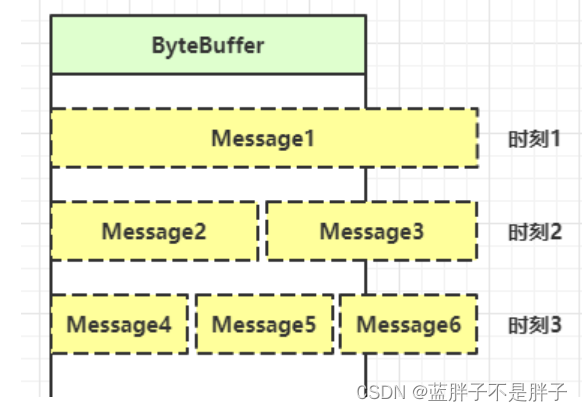
- 一种思路是固定消息长度,数据包大小一样,服务器按预定长度读取,缺点是浪费带宽
- 另一种思路是按分隔符拆分,缺点是效率低
- TLV 格式,即 Type 类型、Length 长度、Value 数据,类型和长度已知的情况下,就可以方便获取消息大小,分配合适的 buffer,缺点是 buffer 需要提前分配,如果内容过大,则影响 server 吞吐量
- Http 1.1 是 TLV 格式
- Http 2.0 是 LTV 格式
服务器端
private static void split(ByteBuffer source) {source.flip();for (int i = 0; i < source.limit(); i++) {// 找到一条完整消息if (source.get(i) == '\n') {int length = i + 1 - source.position();// 把这条完整消息存入新的 ByteBufferByteBuffer target = ByteBuffer.allocate(length);// 从 source 读,向 target 写for (int j = 0; j < length; j++) {target.put(source.get());}debugAll(target);}}source.compact(); // 0123456789abcdef position 16 limit 16
}public static void main(String[] args) throws IOException {// 1. 创建 selector, 管理多个 channelSelector selector = Selector.open();ServerSocketChannel ssc = ServerSocketChannel.open();ssc.configureBlocking(false);// 2. 建立 selector 和 channel 的联系(注册)// SelectionKey 就是将来事件发生后,通过它可以知道事件和哪个channel的事件SelectionKey sscKey = ssc.register(selector, 0, null);// key 只关注 accept 事件sscKey.interestOps(SelectionKey.OP_ACCEPT);log.debug("sscKey:{}", sscKey);ssc.bind(new InetSocketAddress(8080));while (true) {// 3. select 方法, 没有事件发生,线程阻塞,有事件,线程才会恢复运行// select 在事件未处理时,它不会阻塞, 事件发生后要么处理,要么取消,不能置之不理selector.select();// 4. 处理事件, selectedKeys 内部包含了所有发生的事件Iterator<SelectionKey> iter = selector.selectedKeys().iterator(); // accept, readwhile (iter.hasNext()) {SelectionKey key = iter.next();// 处理key 时,要从 selectedKeys 集合中删除,否则下次处理就会有问题iter.remove();log.debug("key: {}", key);// 5. 区分事件类型if (key.isAcceptable()) { // 如果是 acceptServerSocketChannel channel = (ServerSocketChannel) key.channel();SocketChannel sc = channel.accept();sc.configureBlocking(false);ByteBuffer buffer = ByteBuffer.allocate(16); // attachment// 将一个 byteBuffer 作为附件关联到 selectionKey 上SelectionKey scKey = sc.register(selector, 0, buffer);scKey.interestOps(SelectionKey.OP_READ);log.debug("{}", sc);log.debug("scKey:{}", scKey);} else if (key.isReadable()) { // 如果是 readtry {SocketChannel channel = (SocketChannel) key.channel(); // 拿到触发事件的channel// 获取 selectionKey 上关联的附件ByteBuffer buffer = (ByteBuffer) key.attachment();int read = channel.read(buffer); // 如果是正常断开,read 的方法的返回值是 -1if(read == -1) {key.cancel();} else {split(buffer);// 需要扩容if (buffer.position() == buffer.limit()) {ByteBuffer newBuffer = ByteBuffer.allocate(buffer.capacity() * 2);buffer.flip();newBuffer.put(buffer); // 0123456789abcdef3333\nkey.attach(newBuffer);}}} catch (IOException e) {e.printStackTrace();key.cancel(); // 因为客户端断开了,因此需要将 key 取消(从 selector 的 keys 集合中真正删除 key)}}}}
}
客户端
SocketChannel sc = SocketChannel.open();
sc.connect(new InetSocketAddress("localhost", 8080));
SocketAddress address = sc.getLocalAddress();
// sc.write(Charset.defaultCharset().encode("hello\nworld\n"));
sc.write(Charset.defaultCharset().encode("0123\n456789abcdef"));
sc.write(Charset.defaultCharset().encode("0123456789abcdef3333\n"));
System.in.read();
ByteBuffer 大小分配
- 每个 channel 都需要记录可能被切分的消息,因为 ByteBuffer 不能被多个 channel 共同使用,因此需要为每个 channel 维护一个独立的 ByteBuffer
- ByteBuffer 不能太大,比如一个 ByteBuffer 1Mb 的话,要支持百万连接就要 1Tb 内存,因此需要设计大小可变的 ByteBuffer
- 一种思路是首先分配一个较小的 buffer,例如 4k,如果发现数据不够,再分配 8k 的 buffer,将 4k buffer 内容拷贝至 8k buffer,优点是消息连续容易处理,缺点是数据拷贝耗费性能,参考实现 http://tutorials.jenkov.com/java-performance/resizable-array.html
- 另一种思路是用多个数组组成 buffer,一个数组不够,把多出来的内容写入新的数组,与前面的区别是消息存储不连续解析复杂,优点是避免了拷贝引起的性能损耗
4.5 处理 write 事件
一次无法写完例子
- 非阻塞模式下,无法保证把 buffer 中所有数据都写入 channel,因此需要追踪 write 方法的返回值(代表实际写入字节数)
- 用 selector 监听所有 channel 的可写事件,每个 channel 都需要一个 key 来跟踪 buffer,但这样又会导致占用内存过多,就有两阶段策略
- 当消息处理器第一次写入消息时,才将 channel 注册到 selector 上
- selector 检查 channel 上的可写事件,如果所有的数据写完了,就取消 channel 的注册
- 如果不取消,会每次可写均会触发 write 事件
模拟服务器给接收请求的客户端发送大量数据
/*** 处理可读事件*/
@Slf4j
public class WriteServer {public static void main(String[] args) throws IOException {ServerSocketChannel ssc = ServerSocketChannel.open();ssc.bind(new InetSocketAddress(8082));Selector selector = Selector.open();ssc.configureBlocking(false);
// 设置为非阻塞模式后交给选择器 避免资源的浪费轮询
// 服务器连接通道子需要关注是否接收连接请求SelectionKey key = ssc.register(selector, SelectionKey.OP_ACCEPT);// 模拟服务器长期运行等待请求while (true) {/*** : 这个方法会阻塞,直到至少一个通道在注册的事件上就绪(即发生了感兴趣的事件),* 或者当前线程被中断。一旦有事件发生,它会返回就绪通道的数量。*避免无休止的轮询*/selector.select();Iterator<SelectionKey> iterator = selector.selectedKeys().iterator();while (iterator.hasNext()) {SelectionKey selectionKey = iterator.next();iterator.remove();//遍历完成后移除当前元素 避免重复循环
// 检查触发事件类型if (selectionKey.isAcceptable()){/*** @target 模拟只要有客户端连接服务器 服务器就对其发送信息*/// 进行该判断 服务器接收到客户端连接请求SocketChannel channel = ssc.accept();//同意请求
// 同意后连接成功 得到和客户端连接的通道channel.configureBlocking(false);SelectionKey registerkey = channel.register(selector, 0, null);
// 这个监听键关注事件//这里演示写入客户端registerkey.interestOps(SelectionKey.OP_WRITE);StringBuilder sb = new StringBuilder();for (int i = 0; i < 30000000; i++) {sb.append("a");//发送大量数据}ByteBuffer encode = StandardCharsets.UTF_8.encode(sb.toString());//这里演示写入客户端while (encode.hasRemaining()) {int i = channel.write(encode);//返回值代表实际写入的字节数log.debug("服务器写入字节数:{}",i);}}if (selectionKey.isReadable()){}if (selectionKey.isWritable()){}}}}
}当发送的数据量过大,网络通道缓冲区可能就无法一次性携带所有数据 但是一致轮询执行写入操作 造成多次无效写入
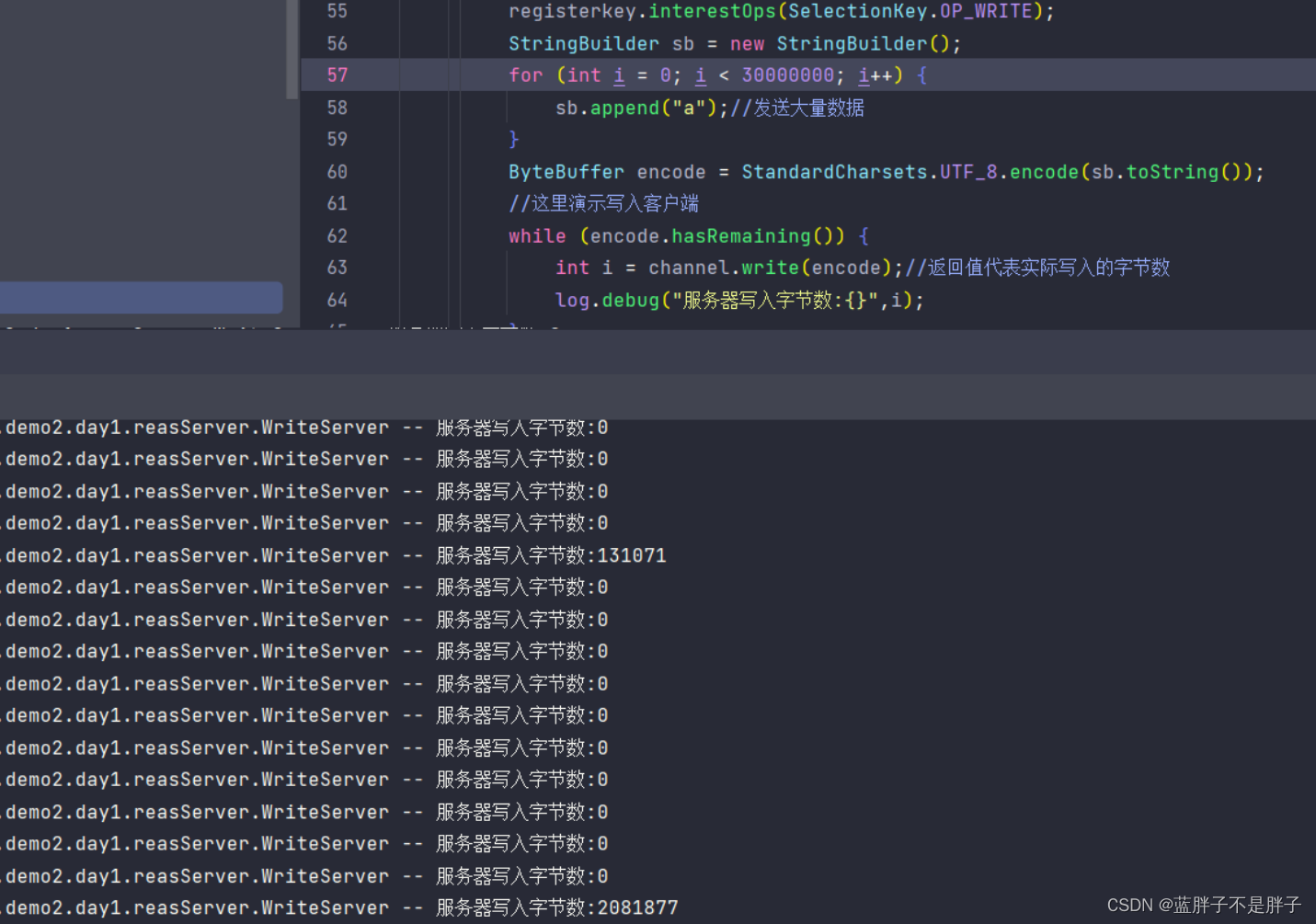
这样并不符合nio思想 已经会有线程堵塞 进行优化 当缓冲区满的时候进行其他操作
/*** 处理可读事件*/
@Slf4j
public class WriteServer {public static void main(String[] args) throws IOException {ServerSocketChannel ssc = ServerSocketChannel.open();ssc.bind(new InetSocketAddress(8082));Selector selector = Selector.open();ssc.configureBlocking(false);
// 设置为非阻塞模式后交给选择器 避免资源的浪费轮询
// 服务器连接通道子需要关注是否接收连接请求SelectionKey key = ssc.register(selector, SelectionKey.OP_ACCEPT);// 模拟服务器长期运行等待请求while (true) {/*** : 这个方法会阻塞,直到至少一个通道在注册的事件上就绪(即发生了感兴趣的事件),* 或者当前线程被中断。一旦有事件发生,它会返回就绪通道的数量。*避免无休止的轮询*/selector.select();Iterator<SelectionKey> iterator = selector.selectedKeys().iterator();while (iterator.hasNext()) {SelectionKey selectionKey = iterator.next();iterator.remove();//遍历完成后移除当前元素 避免重复循环
// 检查触发事件类型if (selectionKey.isAcceptable()){/*** @target 模拟只要有客户端连接服务器 服务器就对其发送信息*/// 进行该判断 服务器接收到客户端连接请求SocketChannel channel = ssc.accept();//同意请求
// 同意后连接成功 得到和客户端连接的通道channel.configureBlocking(false);SelectionKey registerkey = channel.register(selector, 0, null);
// 这个监听键关注事件StringBuilder sb = new StringBuilder();for (int i = 0; i < 300000000; i++) {sb.append("a");//发送大量数据}ByteBuffer encode = StandardCharsets.UTF_8.encode(sb.toString());//这里演示写入客户端int i = channel.write(encode);//先写入一次log.info("处理连接事件时发送字节"+i);
// 在判断是否有剩余if(encode.hasRemaining()) {//如果剩余 就为本次连接添加可以写入的监听事件registerkey.interestOps(registerkey.interestOps()+SelectionKey.OP_WRITE);//原有监听加上当前设置监听 避免替换registerkey.attach(encode); //将剩余数据作为附件 留给可写事件触发时候写入}}if (selectionKey.isReadable()){}if (selectionKey.isWritable()){
// 当前网络缓冲可以写入
// 拿到未写完的附件ByteBuffer buffer = (ByteBuffer) selectionKey.attachment();SocketChannel channel = (SocketChannel) selectionKey.channel();
//继续写入int i = channel.write(buffer);log.info("处理写事件时发送字节"+i);
// 如果数据量很大很大 还没有完成 记录日志 反之下次循环会进行if(!buffer.hasRemaining()) {
// 写入完成则 将当前监听的key 移除触发监听的队列log.info("写入完成");buffer.clear();//写完后清理缓存区 避免占用过多内存selectionKey.interestOps(selectionKey.interestOps()-SelectionKey.OP_WRITE);}}}}}
}此时可以一快速通道 没有缓存区满 无效写入的情况
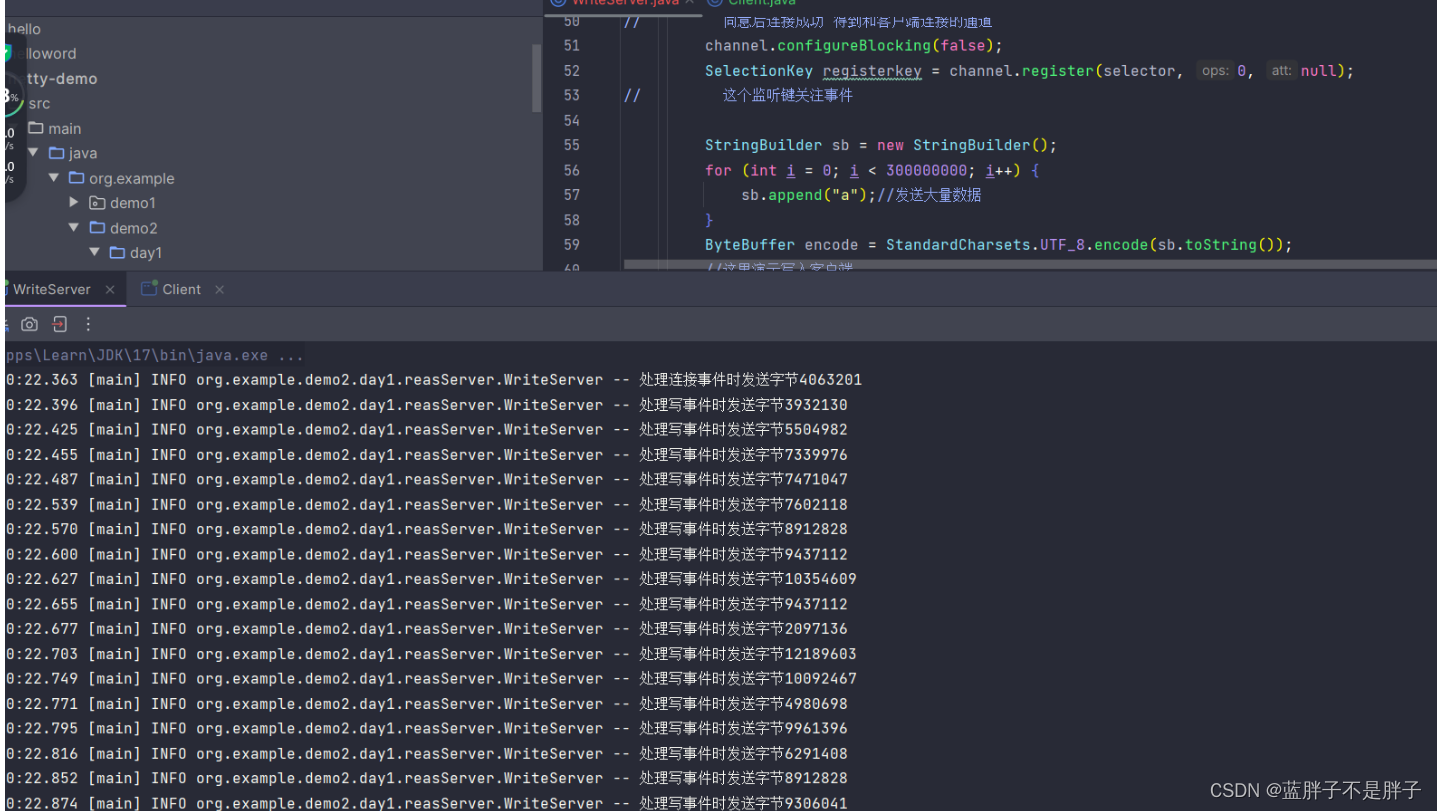
客户端
public class WriteClient {public static void main(String[] args) throws IOException {Selector selector = Selector.open();SocketChannel sc = SocketChannel.open();sc.configureBlocking(false);sc.register(selector, SelectionKey.OP_CONNECT | SelectionKey.OP_READ);sc.connect(new InetSocketAddress("localhost", 8080));int count = 0;while (true) {selector.select();Iterator<SelectionKey> iter = selector.selectedKeys().iterator();while (iter.hasNext()) {SelectionKey key = iter.next();iter.remove();if (key.isConnectable()) {System.out.println(sc.finishConnect());} else if (key.isReadable()) {ByteBuffer buffer = ByteBuffer.allocate(1024 * 1024);count += sc.read(buffer);buffer.clear();System.out.println(count);}}}}
}
💡 write 为何要取消
只要向 channel 发送数据时,socket 缓冲可写,这个事件会频繁触发,因此应当只在 socket 缓冲区写不下时再关注可写事件,数据写完之后再取消关注
4.6 更进一步
//也是netty的核心逻辑
💡 利用多线程优化
现在都是多核 cpu,设计时要充分考虑别让 cpu 的力量被白白浪费
前面的代码只有一个选择器,没有充分利用多核 cpu,如何改进呢?
分两组选择器
- 单线程配一个选择器,专门处理 accept 事件
- 创建 cpu 核心数的线程,每个线程配一个选择器,轮流处理 read 事件
public class ChannelDemo7 {public static void main(String[] args) throws IOException {new BossEventLoop().register();}@Slf4jstatic class BossEventLoop implements Runnable {private Selector boss;private WorkerEventLoop[] workers;private volatile boolean start = false;AtomicInteger index = new AtomicInteger();public void register() throws IOException {if (!start) {ServerSocketChannel ssc = ServerSocketChannel.open();ssc.bind(new InetSocketAddress(8080));ssc.configureBlocking(false);boss = Selector.open();SelectionKey ssckey = ssc.register(boss, 0, null);ssckey.interestOps(SelectionKey.OP_ACCEPT);workers = initEventLoops();new Thread(this, "boss").start();log.debug("boss start...");start = true;}}public WorkerEventLoop[] initEventLoops() {
// EventLoop[] eventLoops = new EventLoop[Runtime.getRuntime().availableProcessors()];WorkerEventLoop[] workerEventLoops = new WorkerEventLoop[2];for (int i = 0; i < workerEventLoops.length; i++) {workerEventLoops[i] = new WorkerEventLoop(i);}return workerEventLoops;}@Overridepublic void run() {while (true) {try {boss.select();Iterator<SelectionKey> iter = boss.selectedKeys().iterator();while (iter.hasNext()) {SelectionKey key = iter.next();iter.remove();if (key.isAcceptable()) {ServerSocketChannel c = (ServerSocketChannel) key.channel();SocketChannel sc = c.accept();sc.configureBlocking(false);log.debug("{} connected", sc.getRemoteAddress());workers[index.getAndIncrement() % workers.length].register(sc);}}} catch (IOException e) {e.printStackTrace();}}}}@Slf4jstatic class WorkerEventLoop implements Runnable {private Selector worker;private volatile boolean start = false;private int index;private final ConcurrentLinkedQueue<Runnable> tasks = new ConcurrentLinkedQueue<>();public WorkerEventLoop(int index) {this.index = index;}public void register(SocketChannel sc) throws IOException {if (!start) {worker = Selector.open();new Thread(this, "worker-" + index).start();start = true;}tasks.add(() -> {try {SelectionKey sckey = sc.register(worker, 0, null);sckey.interestOps(SelectionKey.OP_READ);worker.selectNow();} catch (IOException e) {e.printStackTrace();}});worker.wakeup();}@Overridepublic void run() {while (true) {try {worker.select();Runnable task = tasks.poll();if (task != null) {task.run();}Set<SelectionKey> keys = worker.selectedKeys();Iterator<SelectionKey> iter = keys.iterator();while (iter.hasNext()) {SelectionKey key = iter.next();if (key.isReadable()) {SocketChannel sc = (SocketChannel) key.channel();ByteBuffer buffer = ByteBuffer.allocate(128);try {int read = sc.read(buffer);if (read == -1) {key.cancel();sc.close();} else {buffer.flip();log.debug("{} message:", sc.getRemoteAddress());debugAll(buffer);}} catch (IOException e) {e.printStackTrace();key.cancel();sc.close();}}iter.remove();}} catch (IOException e) {e.printStackTrace();}}}}
}
💡 如何拿到 cpu 个数
- Runtime.getRuntime().availableProcessors() 如果工作在 docker 容器下,因为容器不是物理隔离的,会拿到物理 cpu 个数,而不是容器申请时的个数
- 这个问题直到 jdk 10 才修复,使用 jvm 参数 UseContainerSupport 配置, 默认开启
4.7 UDP
- UDP 是无连接的,client 发送数据不会管 server 是否开启
- server 这边的 receive 方法会将接收到的数据存入 byte buffer,但如果数据报文超过 buffer 大小,多出来的数据会被默默抛弃
首先启动服务器端
public class UdpServer {public static void main(String[] args) {try (DatagramChannel channel = DatagramChannel.open()) {channel.socket().bind(new InetSocketAddress(9999));System.out.println("waiting...");ByteBuffer buffer = ByteBuffer.allocate(32);channel.receive(buffer);buffer.flip();debug(buffer);} catch (IOException e) {e.printStackTrace();}}
}
输出
waiting...
运行客户端
public class UdpClient {public static void main(String[] args) {try (DatagramChannel channel = DatagramChannel.open()) {ByteBuffer buffer = StandardCharsets.UTF_8.encode("hello");InetSocketAddress address = new InetSocketAddress("localhost", 9999);channel.send(buffer, address);} catch (Exception e) {e.printStackTrace();}}
}
接下来服务器端输出
+-------------------------------------------------+| 0 1 2 3 4 5 6 7 8 9 a b c d e f |
+--------+-------------------------------------------------+----------------+
|00000000| 68 65 6c 6c 6f |hello |
+--------+-------------------------------------------------+----------------+
5. NIO vs BIO
5.1 stream vs channel
- stream 不会自动缓冲数据,channel 会利用系统提供的发送缓冲区、接收缓冲区(更为底层)
- stream 仅支持阻塞 API,channel 同时支持阻塞、非阻塞 API,网络 channel 可配合 selector 实现多路复用
- 二者均为全双工,即读写可以同时进行
5.2 IO 模型
同步阻塞、同步非阻塞、同步多路复用、异步阻塞(没有此情况)、异步非阻塞
- 同步:线程自己去获取结果(一个线程)
- 异步:线程自己不去获取结果,而是由其它线程送结果(至少两个线程)
在计算机网络编程中,I/O(输入/输出)模型是处理网络请求的关键部分。理解不同类型的I/O模型有助于优化程序性能。这里我将解释五种常见的I/O模型:同步阻塞、同步非阻塞、同步多路复用、异步阻塞(虽然这种模型实际上并不存在)和异步非阻塞。
1.同步阻塞(Blocking Synchronous):
2.解释:在这种模型中,一个线程发起I/O操作,然后等待操作完成。在等待期间,线程无法执行其他任务。
3.例子:想象你在餐厅点餐。你(线程)给服务员(系统)下了订单后,就坐在桌子旁等待。在食物没有准备好之前,你什么也做不了,只能等待。4.同步非阻塞(Non-Blocking Synchronous):
5.解释:在这种模型中,线程在发起I/O操作后不需要等待操作完成,它会不断地检查操作是否完成。
6.例子:你在自助餐厅用餐。你点了某样食物,不需要坐下等待,而是可以四处走动,不时回来检查食物是否准备好。7.同步多路复用(Synchronous Multiplexing):
8.解释:这种模型允许单个线程监视多个I/O操作。当其中一个操作完成,线程会被通知并处理该操作。
9.例子:想象你在一个游戏厅,玩多个游戏机。你在每个游戏机上投了硬币,然后在游戏机之间徘徊。一旦某个游戏准备好,你就会收到通知并开始玩。10.异步阻塞(Blocking Asynchronous):
11.解释:实际上,这种模型是不存在的,因为“异步”与“阻塞”是相互矛盾的概念。异步意味着你不需要等待操作完成,而阻塞则意味着你在等待。
12.异步非阻塞(Non-Blocking Asynchronous):
13.解释:在这个模型中,线程发起一个I/O操作,然后继续执行其他任务。当I/O操作完成时,线程会收到一个通知。
14.例子:你在网上订购了一份外卖。在等待外卖送达的同时,你可以做其他事情(如看电视、读书)。当外卖送达时,你会收到通知。
同步类似单线程,异步类似并发同时执行
同步阻塞、同步非阻塞、同步多路复用都属于同步,非阻塞io本质上是通过单线任务执行,有在这种模式下,当一个I/O请求发起时,如果数据不可用,系统调用会立即返回一个状态,表明数据目前不可读或不可写,阻塞模式就会一直等待,非阻塞模式不管结果继续执行,然后不断轮询等待结果,多路复用则是添加选择器来进行状态的事件触发,其都是单一执行
只有异步非阻塞是异步的,如果当前任务没有执行到状态结果,另一个同时执行的线程可以通过回调方法返回给当前线程,而异步阻塞不存在,异步操作了不可能会阻塞线程
俩者区别
- 非阻塞I/O:在这种模式下,当一个I/O请求发起时,如果数据不可用,系统调用会立即返回一个状态,表明数据目前不可读或不可写。这种情况下,应用程序可以继续执行其他任务。然而,为了完成I/O操作,应用程序需要不断地轮询或检查数据是否变得可用。这就意味着虽然应用程序不会因为一个I/O请求而停止运行,但它仍需要定期地检查或等待I/O操作的完成。
- 异步I/O:当应用程序发起一个异步I/O操作时,它可以立即继续执行下一段代码,无需等待I/O操作的完成。在I/O操作完成时,系统会通过某种机制(如事件、通知或回调函数)来通知应用程序。这意味着应用程序不需要主动检查I/O操作的状态,从而可以更有效地利用其资源来执行其他任务。
当调用一次 channel.read 或 stream.read 后,会切换至操作系统内核态来完成真正数据读取,而读取又分为两个阶段,分别为:
- 等待数据阶段
- 复制数据阶段
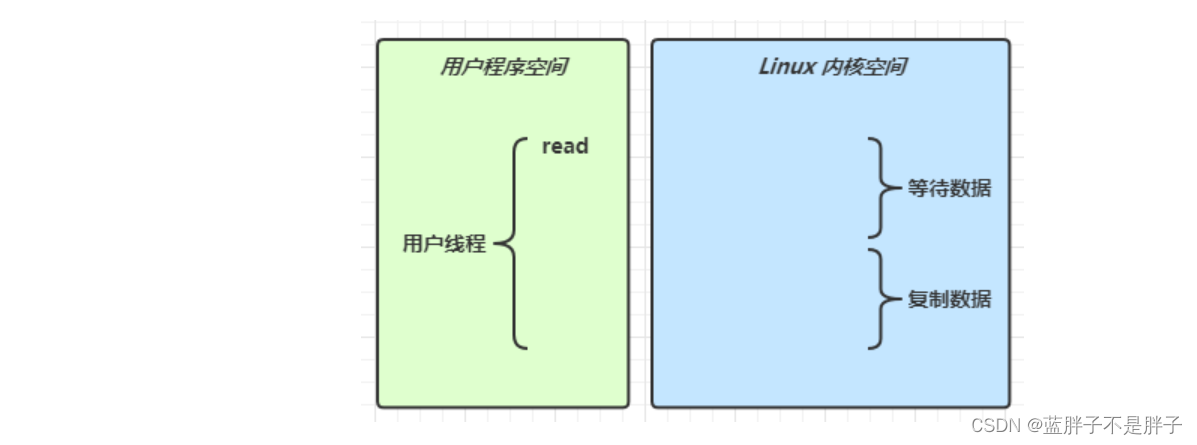
-
阻塞 IO

-
非阻塞 IO
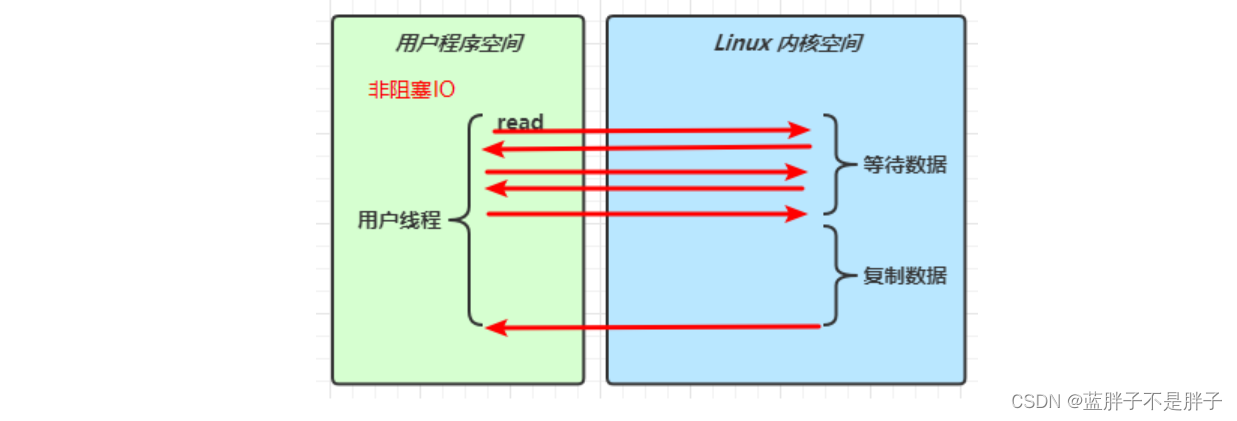
-
多路复用
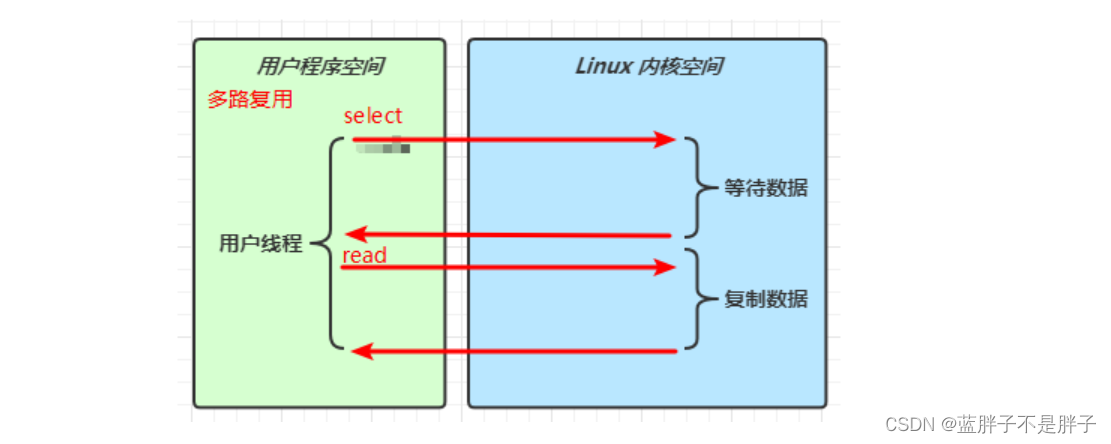
-
信号驱动
-
异步 IO
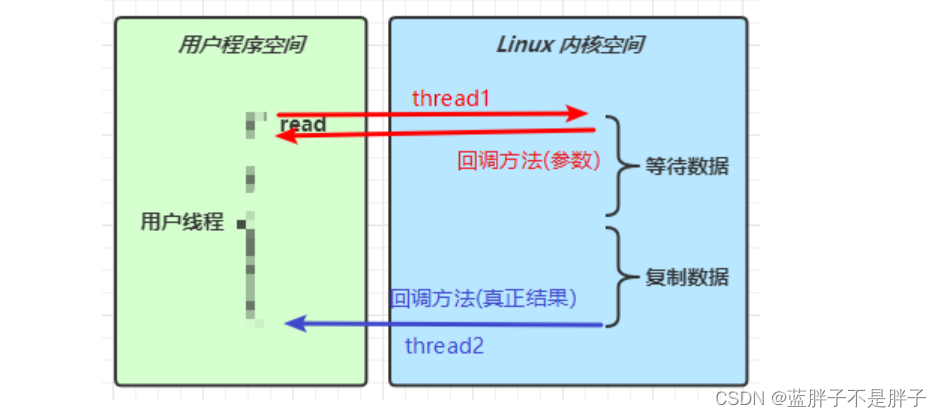
-
阻塞 IO vs 多路复用
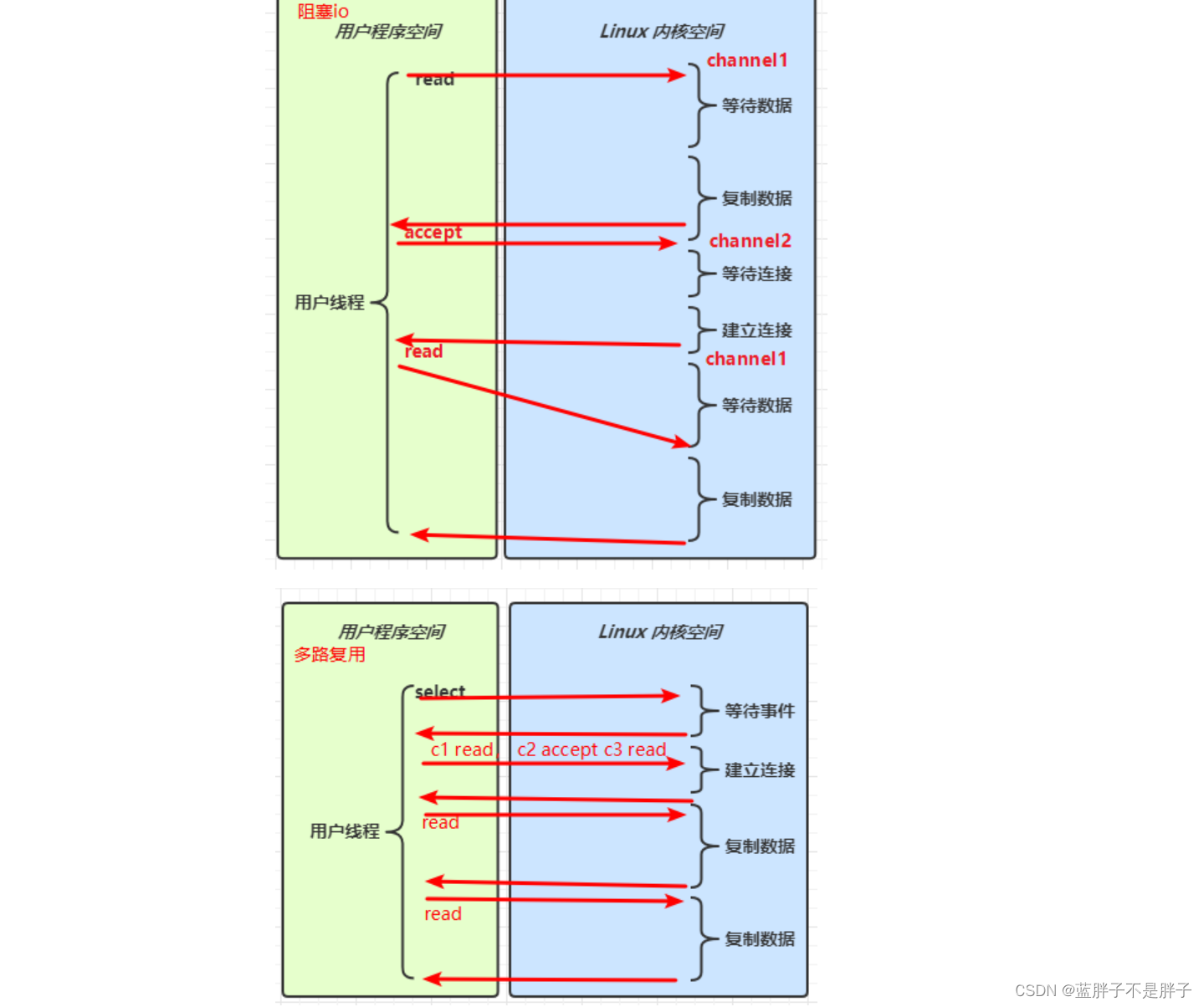
🔖 参考
UNIX 网络编程 - 卷 I
5.3 零拷贝
传统 IO 问题
传统的 IO 将一个文件通过 socket 写出
File f = new File("helloword/data.txt");
RandomAccessFile file = new RandomAccessFile(file, "r");byte[] buf = new byte[(int)f.length()];
file.read(buf);Socket socket = ...;
socket.getOutputStream().write(buf);
内部工作流程是这样的:
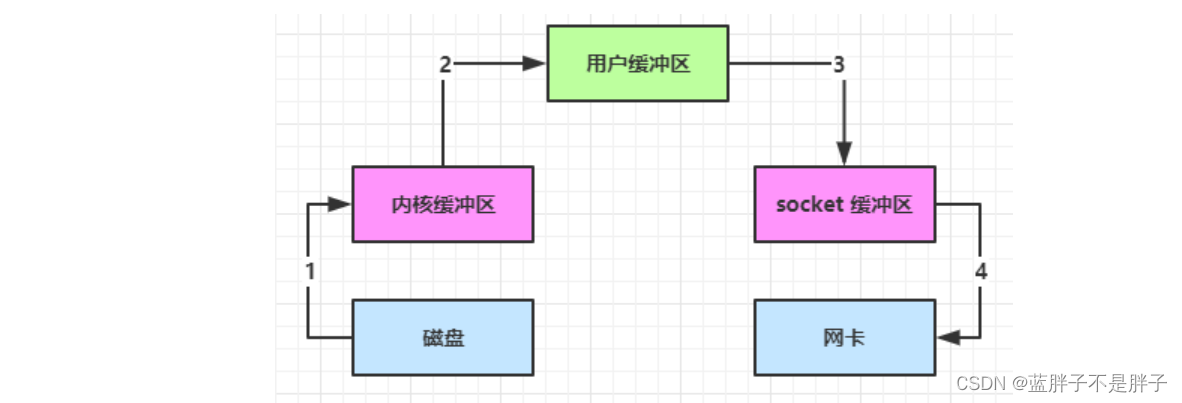
-
java 本身并不具备 IO 读写能力,因此 read 方法调用后,要从 java 程序的用户态切换至内核态,去调用操作系统(Kernel)的读能力,将数据读入内核缓冲区。这期间用户线程阻塞,操作系统使用 DMA(Direct Memory Access)来实现文件读,其间也不会使用 cpu
DMA 也可以理解为硬件单元,用来解放 cpu 完成文件 IO
-
从内核态切换回用户态,将数据从内核缓冲区读入用户缓冲区(即 byte[] buf),这期间 cpu 会参与拷贝,无法利用 DMA
-
调用 write 方法,这时将数据从用户缓冲区(byte[] buf)写入 socket 缓冲区,cpu 会参与拷贝
-
接下来要向网卡写数据,这项能力 java 又不具备,因此又得从用户态切换至内核态,调用操作系统的写能力,使用 DMA 将 socket 缓冲区的数据写入网卡,不会使用 cpu
可以看到中间环节较多,java 的 IO 实际不是物理设备级别的读写,而是缓存的复制,底层的真正读写是操作系统来完成的
- 用户态与内核态的切换发生了 3 次,这个操作比较重量级
- 数据拷贝了共 4 次
NIO 优化
通过 DirectByteBuf
- ByteBuffer.allocate(10) HeapByteBuffer 使用的还是 java 内存 使用的byte数组封装
- ByteBuffer.allocateDirect(10) DirectByteBuffer 使用的是操作系统内存 操作系统和java代码哦都可以对这部分内存共享

大部分步骤与优化前相同,不再赘述。唯有一点:java 可以使用 DirectByteBuf 将堆外内存映射到 jvm 内存中来直接访问使用
- 这块内存不受 jvm 垃圾回收的影响,因此内存地址固定,有助于 IO 读写
- java 中的 DirectByteBuf 对象仅维护了此内存的虚引用,内存回收分成两步
- DirectByteBuf 对象被垃圾回收,将虚引用加入引用队列
- 通过专门线程访问引用队列,根据虚引用释放堆外内存
- 减少了一次数据拷贝,用户态与内核态的切换次数没有减少
进一步优化(底层采用了 linux 2.1 后提供的 sendFile 方法),java 中对应着两个 channel 调用 transferTo/transferFrom 方法拷贝数据

- java 调用 transferTo 方法后,要从 java 程序的用户态切换至内核态,使用 DMA将数据读入内核缓冲区,不会使用 cpu
- 数据从内核缓冲区传输到 socket 缓冲区,cpu 会参与拷贝
- 最后使用 DMA 将 socket 缓冲区的数据写入网卡,不会使用 cpu
可以看到
- 只发生了一次用户态与内核态的切换
- 数据拷贝了 3 次
进一步优化(linux 2.4)

- java 调用 transferTo 方法后,要从 java 程序的用户态切换至内核态,使用 DMA将数据读入内核缓冲区,不会使用 cpu
- 只会将一些 offset 和 length 信息拷入 socket 缓冲区,几乎无消耗
- 使用 DMA 将 内核缓冲区的数据写入网卡,不会使用 cpu
整个过程仅只发生了一次用户态与内核态的切换,数据拷贝了 2 次。所谓的【零拷贝】,并不是真正无拷贝,而是在不会拷贝重复数据到 jvm 内存中,直接磁盘读取到缓冲区或者网络,零拷贝的优点有
- 更少的用户态与内核态的切换
- 不利用 cpu 计算,减少 cpu 缓存伪共享
- 零拷贝适合小文件传输
5.3 AIO(async input out)
AIO 用来解决数据复制阶段的阻塞问题
- 同步意味着,在进行读写操作时,线程需要等待结果,还是相当于闲置
- 异步意味着,在进行读写操作时,线程不必等待结果,而是将来由操作系统来通过回调方式由另外的线程来获得结果
异步模型需要底层操作系统(Kernel)提供支持
- Windows 系统通过 IOCP 实现了真正的异步 IO
- Linux 系统异步 IO 在 2.6 版本引入,但其底层实现还是用多路复用模拟了异步 IO,性能没有优势
文件 AIO
先来看看 AsynchronousFileChannel
@Slf4j
public class AioDemo1 {public static void main(String[] args) throws IOException {try{AsynchronousFileChannel s =
// 异步文件通道AsynchronousFileChannel.open(Paths.get("target.txt"), StandardOpenOption.READ);ByteBuffer buffer = ByteBuffer.allocate(512);//建立缓冲区log.debug("begin...");/*** @param1 缓冲区* @param2 读取位置 position* @param3 读取附件 一般是bytebuffer 如果没有读写完 留给下一次* @param4 回调函数**/s.read(buffer, 0, null, new CompletionHandler<Integer, ByteBuffer>() {@Overridepublic void completed(Integer result, ByteBuffer attachment) {log.debug("read completed...{}", result);buffer.flip();System.out.println("读取文件的数据"+StandardCharsets.UTF_8.decode(buffer));
// debugAll(buffer);}@Overridepublic void failed(Throwable exc, ByteBuffer attachment) {log.debug("read failed...");}});} catch (IOException e) {e.printStackTrace();}log.debug("do other things...");System.in.read();}
}
输出
13:44:56 [DEBUG] [main] c.i.aio.AioDemo1 - begin...
13:44:56 [DEBUG] [main] c.i.aio.AioDemo1 - do other things...
13:44:56 [DEBUG] [Thread-5] c.i.aio.AioDemo1 - read completed...2+-------------------------------------------------+| 0 1 2 3 4 5 6 7 8 9 a b c d e f |
+--------+-------------------------------------------------+----------------+
|00000000| 61 0d |a. |
+--------+-------------------------------------------------+----------------+
可以看到
- 响应文件读取成功的是另一个线程 Thread-5
- 主线程并没有 IO 操作阻塞
💡 守护线程
默认文件 AIO 使用的线程都是守护线程,所以最后要执行 System.in.read() 以避免守护线程意外结束
网络 AIO
public class AioServer {public static void main(String[] args) throws IOException {AsynchronousServerSocketChannel ssc = AsynchronousServerSocketChannel.open();ssc.bind(new InetSocketAddress(8080));ssc.accept(null, new AcceptHandler(ssc));System.in.read();}private static void closeChannel(AsynchronousSocketChannel sc) {try {System.out.printf("[%s] %s close\n", Thread.currentThread().getName(), sc.getRemoteAddress());sc.close();} catch (IOException e) {e.printStackTrace();}}private static class ReadHandler implements CompletionHandler<Integer, ByteBuffer> {private final AsynchronousSocketChannel sc;public ReadHandler(AsynchronousSocketChannel sc) {this.sc = sc;}@Overridepublic void completed(Integer result, ByteBuffer attachment) {try {if (result == -1) {closeChannel(sc);return;}System.out.printf("[%s] %s read\n", Thread.currentThread().getName(), sc.getRemoteAddress());attachment.flip();System.out.println(Charset.defaultCharset().decode(attachment));attachment.clear();// 处理完第一个 read 时,需要再次调用 read 方法来处理下一个 read 事件sc.read(attachment, attachment, this);} catch (IOException e) {e.printStackTrace();}}@Overridepublic void failed(Throwable exc, ByteBuffer attachment) {closeChannel(sc);exc.printStackTrace();}}private static class WriteHandler implements CompletionHandler<Integer, ByteBuffer> {private final AsynchronousSocketChannel sc;private WriteHandler(AsynchronousSocketChannel sc) {this.sc = sc;}@Overridepublic void completed(Integer result, ByteBuffer attachment) {// 如果作为附件的 buffer 还有内容,需要再次 write 写出剩余内容if (attachment.hasRemaining()) {sc.write(attachment);}}@Overridepublic void failed(Throwable exc, ByteBuffer attachment) {exc.printStackTrace();closeChannel(sc);}}private static class AcceptHandler implements CompletionHandler<AsynchronousSocketChannel, Object> {private final AsynchronousServerSocketChannel ssc;public AcceptHandler(AsynchronousServerSocketChannel ssc) {this.ssc = ssc;}@Overridepublic void completed(AsynchronousSocketChannel sc, Object attachment) {try {System.out.printf("[%s] %s connected\n", Thread.currentThread().getName(), sc.getRemoteAddress());} catch (IOException e) {e.printStackTrace();}ByteBuffer buffer = ByteBuffer.allocate(16);// 读事件由 ReadHandler 处理sc.read(buffer, buffer, new ReadHandler(sc));// 写事件由 WriteHandler 处理sc.write(Charset.defaultCharset().encode("server hello!"), ByteBuffer.allocate(16), new WriteHandler(sc));// 处理完第一个 accpet 时,需要再次调用 accept 方法来处理下一个 accept 事件ssc.accept(null, this);}@Overridepublic void failed(Throwable exc, Object attachment) {exc.printStackTrace();}}
}



